Should kids get summer homework?
by: Leslie Crawford | Updated: June 12, 2023
Print article

Jill Notte’s daughter Sara is a straight-A student, and she’s taking five advanced-placement courses this fall. It’ll be her senior year.
This ambitious undertaking may prove Sara’s undoing — at least if the 17 year old wants to enjoy her summer vacation. Somewhere in between spending a week at a Girls State program, a month at the New Jersey Governor’s School of Engineering and Technology at Rutger’s University, and visiting a few potential colleges, Sara must complete the following workload before school starts:
• Read five novels for AP English • Read one book for AP History • Complete a packet of assignments and problems for AP Calculus • Complete a packet of assignments and problems for AP Chemistry • Write several summaries of scientific principles for Honors Physics
Oh, and her English teacher recommends that she attend Shakespeare performances at the local college to supplement the many plays she’s required to read as part of AP English. “I try to put a positive spin on it,” says Sara’s mother, Jill. “I told her, ‘Summertime’s a great time to read Shakespeare!'” But, admits Jill, it’s not so easy to put the same kind of “fun” spin on the stack of mind-numbing calculus and chemistry books hefty enough to take down a Yellowstone grizzly.
Forget languidly balmy weeks unwinding from the stress of an intensive school year. Goodbye, as well, to working her usual summer job as a lifeguard, which Sara unhappily has to forgo — along with the money she hoped to save for college. As her mother puts it, “Summer homework is a full-time job.”

A working vacation
Sara’s not alone. The oxymoronically named “vacation work” is on the rise. Sara’s older sister had only a few books to read over the summer when she was in high school — and that was just eight years ago. Jill, who like her daughters was a high achiever in the top five percent of her class, remembers completely homework-free summers.
Many parents remember their own childhood summers as true respites from school, devoid the rigor and rigidity of academic life. Summer was a sprawling mass of unstructured time that ranged from idyllic laziness to stupefying boredom to invigorating camps and family vacations, not scores of math worksheets, science packets, and lists of “good-for-you” classics that hardly qualify as light beach reads.
Harris Cooper, chairman of the department of psychology and neuroscience at Duke University and America’s leading homework scholar who co-authored the landmark meta-study on homework , says that while there exists no formal studies on the rise in summertime homework, he’s witnessed a particularly sharp increase over the past two years — probably a response “to high-stakes testing and accountability issues for schools.”
Just say no?
Some parents argue summer homework is nothing more than bland busywork that saps the joy and spontaneity from summer. So says Sara Bennett, founder of StopHomework.com . “Even if there is a summer slide, I don’t think homework is the solution,” Bennett says. “Kids don’t have enough downtime during the school year. I think they need that freshness during summer.”
Here’s a revolutionary approach for vacation purists who say kids deserve a good, old-fashioned summer free from intense brain-strain: Just say no. That’s what Bennett suggests a parent do in the fall if a child is averse to doing the packet. “I’d send it back and say, ‘I’m sorry, my child didn’t have a chance to do it.’ ” (A parental dispensation only possible for kids who haven’t entered the high-school pressure cooker where — as with Sara Notte — summer homework is graded and can directly affect a student’s chances to enter a top-tier university.)
Protecting young minds from melting
On the other side of the summer homework debate are the moms and dads who, when the school doors slam shut, ramp up the supplemental brain work, even if the teachers didn’t provide it themselves. Most parents, though, fall somewhere in the for-better-or-worse-summer-homework-is-here-to-stay camp.
So if the kids have to do it, can we at least be reassured that it’s a magic bullet to protect young minds from melting? “We can’t say that with any objective data,” Cooper says. “But we would make the assumption if students are continuing to flex their mental muscles over the summer, this would have a positive effect on how much material they retain when they return.”
No buy-in from the kids
“There definitely is a lag — I’m not denying that,” says Denise Pope, senior lecturer at the Stanford University School of Education and co-founder of Challenge Success , a research and student-intervention project. “I absolutely agree that three months is a long time to not do anything. That said, I’m not sure this idea of giving workbooks and pages and pages of handouts works.”
The reason it doesn’t work? “There’s not a buy-in from the [kids],” Pope argues. “In order for any learning to be retained, there has to be engagement on the part of the students.” Pope explains that students need the “ABCs of engagement,” which means they’re engaged affectively, behaviorally, and cognitively. “If they’re intrinsically motivated, then they’ll want to do it.”
“I know kids who get these huge 40-page math packets,” Pope says. “It’s because [teachers] want [kids], over time, to have systematic practice. The problem is that this requires an adult to monitor this kind of disciplined work. It’s not like a kid can do that on his own. So it puts a burden more on the parents.”
Year-round homework blues
So, alas, those nightly angst-ridden homework dramas that run from September through June now get year-round billing. The other problem, Pope says, is that summer homework packets (frequently put off until the last unhappy week before school begins), often seem to fall into an academic black hole once they’re turned in — with no feedback from teachers and no effect on kids’ grades.
As for the work that Pope’s three kids — ages 10, 12, and 15 — get handed at school’s end, she tells them, “‘I won’t bug you about this at all. I won’t be the police.’ We look at the assignments they get for the summer and I say, ‘How long do you think this will take? Do you want me to remind you to do it?’ ” But if they leave it until the tail end of the summer, Pope says, well, that’s their choice. It’s their vacation, after all.

Homes Nearby
Homes for rent and sale near schools

Why your neighborhood school closes for good – and what to do when it does

The best way to study for tests, according to science

4 things that make kids more likely to succeed
Yes! Sign me up for updates relevant to my child's grade.
Please enter a valid email address
Thank you for signing up!
Server Issue: Please try again later. Sorry for the inconvenience

Summer homework may start as early as elementary school, but you don’t have to do it the way it’s always been done! Veteran educators like third-grade teacher Alycia Zimmerman have spent time thinking about how to make summer homework meaningful and interesting enough that students buy in—and even want to do it.
Read on for Zimmerman’s summer homework game plan and ideas for how to make summer assignments more fun for everyone.
1. Try a New Student Meet and Greet
If possible, meet your incoming students before summer break (even if it’s virtual!) to instill the importance of summer learning.
At the end of the school year, coordinate with the teachers of your incoming students to swap classes for a period. Introduce yourselves to your future students and build excitement for the fun and challenging learning ahead and the very “grown-up” summer homework you will assign.
“We’ve been far more successful in instilling the importance of our summer assignments when presenting about it face-to-face rather than just sending a packet of directions home cold,” says Zimmernan. “The students sit on the edges of their seats as we talk about the importance of summer reading and our certainty that they will do everything they can to 'keep their brains healthy, pink, and strong’ over the summer.”
2. Emphasize the Importance of Summer Reading
Talk about the best summer assignment of all: diving into books!
Reading should be a treat, not a menial assignment, so Zimmerman doesn’t feel guilty about making reading the bulk of her summer homework. Here are some of her most effective strategies for promoting summer reading:
Have students fill out a log to keep track of the books and other texts they read over the summer. It isn’t necessary to require a certain number of books or specific titles. Simply ask that they find books they love and spend lots of time reading them.
Have your current students write book reviews of their favorite titles to send home with your rising students. Invite your current students to serve as reading ambassadors and speak to the younger students about the importance and joys of reading. When coming from slightly older peers, the message is very well received.
And of course: Sign your students up for the Scholastic Summer Reading Program ! From May 9 to August 19, your students can visit Scholastic Home Base to participate in the free, fun, and safe summer reading program . As part of the program, kids can read e-books, attend author events, and keep Reading Streaks™ to help unlock a donation of 100K books from Scholastic – distributed to kids with limited or no access to books by Save the Children.
3. Share Fun and Educational Activities
Direct your students to fun (and educational) activities.
When considering other homework, the best options are activities that students will be motivated to do because they’re entertaining.
Give your incoming students the “everything is better in moderation” speech so they understand that they shouldn’t play hours of computer games every day this summer. If possible, send them home with printable and book-based packs to polish their skills for the year ahead (you can even pair these with your own assignments):
4. Connect Through the Mail
Stay connected with your students over the summer through cards.
Giving incoming students the opportunity to connect with you and with each other can motivate them to complete summer assignments. Here’s one plan for connecting via letters:
Have your incoming students mail you a letter of introduction. Explain that you want to hear about their summer activities, their hobbies, their families, and anything special they want you to know before the school year begins.
When you receive letters from your students, send a postcard back with a brief response. Tell them a bit about your summer plan, and let them know you can’t wait to see them in the fall.
Encourage them to write again!
You can also pair up students and have them write to each other over the summer. In September, they can bring their pen pal letters to class to display on the bulletin board.
Take advantage of everyone’s increasing familiarity with virtual resources by connecting online, too! Post a short video, article, or question once a week on your classroom's online platform, and invite both incoming students and rising former students to write their thoughts in the comments section. Be sure to moderate their comments and enjoy their back-and-forth dialogues as they engage with each other.
Get started by shopping the best books for summer reading below! You can find all books and activities at The Teacher Store .
Filter Results
- clear all filters
Resource Type
- Worksheets
- Guided Lessons
- Lesson Plans
- Hands-on Activities
- Interactive Stories
- Online Exercises
- Printable Workbooks
- Science Projects
- Song Videos
middle-school
- Math
- Reading & Writing
- Science
- Social emotional
- Social studies
- Arts & crafts
- Coloring
- Holidays
- Offline games
- Pop Culture & Events
- Asian Pacific American Heritage Month
- Back to School
- Black History Month
- End of the Year
- Hispanic Heritage Month
- Summer
- Women's History Month
- Teacher Resources
- Common Core
Printable Summer Worksheets

In this summer writing prompt worksheet, children will describe a typical summer day.

In this summer writing prompt worksheet, children will describe their summer plans, including the activities they'll do and the places they'll go.

In this summer writing prompt worksheet, children will describe a favorite summer memory.


Summer Vacation Homework: A Fun and Exciting Learning Journey

Students look forward to summer breaks because they allow them to unwind from their regular academic schedule and engage in a variety of enjoyable and growth-promoting activities. While vacations offer opportunities for leisure and relaxation, they also give students a chance to work hard. Summer holiday homework is important in this situation because it gives students the chance to learn new things, improve their skills, and pique their intellectual curiosity. The significance of summer holiday homework will be discussed in this article, along with advice on how to create a visually appealing front-page design.
The Importance of Summer Vacation Homework
The aim of summer holiday homework is multifaceted. It gives them a place to explore new ideas while also assisting in the retention of the knowledge they have acquired throughout the academic year. Students can develop their creativity, critical thinking, and problem-solving talents by doing their homework throughout the summer holiday . They can approach courses more leisurely and exploratorily because they are not under time or exam pressure. Additionally, holiday homework ensures a seamless transition from one grade to the next by bridging the gap between succeeding academic years.
Making an Interesting Front Page for Vacation Homework:
Students and teachers will first notice the tasks set on the front page of holiday homework. In addition to drawing attention, a well-designed front page also establishes the tone for the entire work. Here are some ideas for designing an eye-catching front page for
Summer Holiday Homework
Use Vibrant Colors: To make the front page visually appealing, use vibrant, eye-catching colors. The atmosphere of summer holidays is wonderfully complemented by the enthusiasm and energy that colors like orange, green, and yellow evoke.
Include Useful Imagery:
Include pertinent pictures or photographs that connect to the topics or issues covered in the homework. This offers a preview of the thrilling ride that lies ahead in addition to adding aesthetic interest.
Interesting Title:
Pick a title that captures the essence of the holiday homework and is intriguing. It ought to pique attention and encourage deeper investigation of the given responsibilities.
Include the name and grade of the student:
Make the front page more distinctive by prominently displaying the student’s name and grade. This gives the work a sense of ownership and pride and gives it more meaning for the student.
Clean and Well-Ordered Layout:
Make sure the layout of the front page is neat and efficient. To help readers navigate the various sections of the homework, use distinct headers and subheadings.
Innovative Fonts
Try out several fonts to make the text more aesthetically pleasing. However, make sure that the chosen font is readable and does not reduce the content’s legibility.
Designs With a Theme:
If the holiday homework is based on a particular topic, including components in the front page design that correspond to the theme. As a result, the aesthetic appeal is improved overall, and a coherent visual narrative is produced.
uplifting quotes
Include a motivational saying about education, learning, or personal development. As a result, the atmosphere is upbeat and students are inspired to pursue their homework with enthusiasm.
Conclusion:
Students have a great chance to engage in worthwhile and beneficial learning activities through summer holiday homework . In addition to providing a pleasurable way to pass the time during the holidays, it helps with learning retention, skill improvement, and personal growth. Students can further increase the attraction of their holiday homework and provide a favorable first impression by producing an eye-catching front page. So embrace the voyage of summer holiday homework and start your thrilling learning and fun adventure!
- Advertisement -
Unmatched Elegance on Wheels: Dubai’s Premier Luxury Limousine Experience
Experiencing the splendor of samburu: an unparalleled safari expedition, exploring the convenience of shuttle services from red rocks to denver, the top 7 budapest boat tours to experience the city’s charm, luxury travel redefined: premium chauffeur services in basel and zurich airport, when should you start looking for a pg to stay, grow your babysitting business with these 5 local marketing strategies, unlock amazing journeys with irresistible travel offers, triund trek: a complete guide, revealing the enchanting northeast with arunachal pradesh tour packages, unleash your inner adventurer: storm chasing holidays, everest base camp trek.
Copyright © 2024. All Rights Reserved By The Vacation Vibes
How to Squeeze the Most Out of Summer Homework

We know it takes the adolescent brain a few weeks or more to get back up to speed after the long summer break. Many teachers, particularly in the high school grades, try to reduce their students’ brain power regression by trying to keep them busy over the vacation. How can summer homework, particularly reading, benefit students without seeming like a chore? The answer is complex, and it partly depends on how helpful you feel about homework in the first place.
Tips to Make Summer Homework Worthwhile
Just like classroom and home learning during the school year, if summer homework tasks are inauthentic (e.g., busy work), they will serve little to no purpose. But, the brain drain of the summer months is real. So, how do we ensure that our students are firing on all cylinders when they walk through our doors in the fall? Here are some things to keep in mind when assigning summer homework.
1. Make Sure the Tasks Count for Something
Nothing will generate ill will amongst students faster than telling them their summer work was all for naught, but you wouldn’t believe how many teachers forget their students even had anything assigned over the summer break.
Students have read your books or have done your homework in good faith. The summer homework needs to be included or even dominate your first unit of the new school year. Otherwise, you might have some trust issues to address.
2. Make Summer Work Tasks Authentic
Students, especially older ones, can quickly sniff out busy work; they are less likely to give their best effort when they sense it.
If it’s something you wouldn’t assign during class—but might give to a substitute if you’re out—don’t assign it over the summer break. The goal is to prepare students for their upcoming studies just as much as it is to keep them from forgetting what they learned in the previous school year. Find a mix of the new with the old, and make it as engaging as possible.
3. Allow Some Summer Homework to Be Self-Guided
It’s no secret that the more input the student has in the task, the more engaging the lesson becomes. Because you’re not necessarily worried about mastery of new material and aren’t focusing on academic standards, there’s no harm in letting the students choose from a list of possible projects or books to read. Try assigning a “ Passion Project ”, where students choose a topic of personal interest and create a project or presentation around it.
4. Utilize the Ultimate Flipped Learning Opportunity
Perhaps you’re a flipped learning veteran or may still be just dabbling. Either way, summer break is the perfect opportunity to assign some lesson videos from your own library or an online resource.
Have students watch some TED Talks or lectures from Coursera or instructional videos from Khan Academy . They might not come in with complete mastery of the assigned topics, but they will be much better prepared to begin learning the material than if they were just doing worksheets from last school year’s work.
5. Celebrate Achievements and Milestones
If you have the resources, include a voluntary option for students to track their achievements and milestones online. Doing so can help students stay accountable in completing assignments while giving teachers the opportunity to motivate their students to continue their learning journey. You can experiment with virtual awards ceremonies, certificates of achievement, or personalized feedback messages. Consider acknowledging everyone again in person at the beginning of the school year to include those who were unable to participate online.
6. Encourage Peer Collaboration and Support
Another option to consider is incorporating group projects, peer review activities, and collaborative discussions into summer homework assignments to encourage students to actively engage with course content and develop essential teamwork and communication skills. Peer collaboration also fosters a sense of camaraderie and accountability among students, as they work together to achieve common goals and support each other's learning journey. For example, try facilitating peer review sessions where students provide feedback and support to their peers on their homework assignments. Students can exchange drafts of their essays or presentations and provide constructive feedback on areas for improvement. Suggest using free online platforms like Google Docs or Padlet for peer collaboration.
Looking for other fun ideas to encourage learning over summer break? Check out Edmentum’s free 30-Day Summer Challenge . Our flyer includes creative ideas designed to keep students engaged in their learning. With 30 days’ worth of fun activities, facts, and resources, learners are bound to learn something new each day and make the most out of summer break.
This post was originally published in June 2013 and has been updated.
Get the latest education insights sent directly to your inbox
Subscribe to our knowledge articles.
- Owners & Directors
- Teachers & Educators
- Parents & Students
- Primary and Secondary Schools
- Preschool & Childcare Software
- Education Franchises
- Kinderpedia Academy
- White Papers
- Expert Talks
- Classroom Management
- Parent Engagement
- Tuition Management
- Progress Monitoring
- School Management
- Case Studies
© Kinderpedia. All rights reserved.

Summer holiday homework ideas that encourage creativity and foster a thirst for knowledge
Experiments, cross-curricular activities, microlearning, hands-on learning, deepening knowledge - the perspectives from which we can approach learning during the summer holidays are countless. The summer months mean free time, travelling, fun and days without alarm clocks for children. But because the holidays offer youngsters the luxury of time, they can invest some of it in something very valuable: self-development. And this can also be done through the intensely debated summer holiday homework.
Summer holiday homework - beneficial or a waste of time?
- How summer holiday assignments build useful skills
Learning by doing applied to summer holiday homework
- Using technology to check off summer holiday assignments
Microlearning and collaborative learning
When it comes to holiday homework, teachers, parents and students divide into two antagonistic camps: some argue that homework keeps children learning at a beneficial pace, reducing the loss of subject matter that is typical of holiday periods, and helps them consolidate the information they have accumulated during the school year. The other camp believes that youngsters should take a total break from school activities and enjoy a well-deserved holiday.
How summer holiday assignments foster collaboration, planning and leadership skills

Read also: How to prevent summer learning loss. Useful activites and tools
The summer holidays can be a good opportunity to tackle the topics covered during school in a practical and non-disciplinary way. Children can practice working with numbers by calculating the restaurant bill or how many seashells fit on the sole of a beach slipper or what day the half-term holiday falls on, for example. They can practise their reading skills by trying to look at the menu themselves and ordering, or by reading explanations of the different sights they visit. They can do the same in a foreign language if they go on holiday abroad. To get them to learn more about animals, pupils can be encouraged to design a board game based on animal habitats and characteristics.
Books inspire children and make their holidays more enjoyable. When teachers approach reading creatively and with a holiday spirit, students are captivated. A list of questions about the action in the book will pique their curiosity. A first chapter read togethe in class can encourage them to read further. The prospect of a whole-class play will persuade them to discover the story.
Using technology to check off summer holiday assignments
Discover Kinderpedia
Kinderpedia
The complete communication and management solution for schools and childcare centres.
Simplifies teachers' work and brings parents closer to their children's school progress.

Recommended articles

Kinderpedia secures Leader position for Daycare software in Gartner’s Get App review platform

Kinderpedia reaffirmed Leader in Child Care software [G2 Spring 2024 reports]

How do you make learning a pleasant experience?
Want to improve your center quality? Kinderpedia is here to help! Not only do we provide thousands of informational content pieces like blog posts , podcasts , webinars and more, we are also makers of the #1 Rated and Reviewed Childcare Software.
Related Posts

Cyberbullying in schools: What is it and how to prevent it

From Chalkboard to Keyboard: Integrating Technology in Teaching
Best solution for.
- Preschool & Childcare Centres
- Primary & Elementary Schools
- School Chains & Education Franchises
- Tuition & Fee Management
- Observation and Assessment
- All-in-one Platform
- International Recognition
- Media Centre
Connect with us
- Privacy Policy
- Terms of Service
- Cookie Policy
Switzerland
United arab emirates, united kingdom.
Should Schools Assign Summer Homework? Educators Weigh In

- Share article
School’s almost out for summer. Should students clear out their lockers and leave empty-handed—or laden down with stacks of math problems and required reading lists? Will teachers warn of repercussions for failing to turn in summer work assignments upon returning to school in the fall, or simply advise students to have fun and stay safe?
It depends on whom you ask.
It turns out that not all educators share the same perspective on whether to assign summer homework, who needs it most, what it should consist of, and how to make sure it gets done. Education Week put the question to state teachers of the year and representatives of statewide principals associations. Here’s what they had to say.
Play and pleasure reading prioritized by many educators
Play and pleasure reading topped the list of responses to the question: What summer homework should students be assigned? Teachers (of both young and older students) were more likely than the principals who responded to suggest that kids need a break in the summer.
“For young children, specifically pre-K to grade 3, I feel that over the summer children need to have their summer break and be provided with the opportunity to explore, get plenty of physical activity, and play. Children learn from play. Play teaches children about problem-solving and social interactions,” said Tara Hughes, a pre-K inclusion teacher at the Nye Early Childhood Center in Santa Fe who was voted 2023 New Mexico State Teacher of the Year.
“Students should have no formal ‘homework'—worksheets or practice books,” said Lori Danz, who is Wisconsin’s 2023 State Teacher of the Year. She teaches high school biology and serves as a school forest coordinator, overseeing outdoor learning. in the Superior school district in the northern part of the state. “I think it’s good for students and families to get away from that, and learn in authentic ways: hiking, cooking, fixing things. So much learning happens that way. We forget that it’s learning.”
Danz acknowledged that not every family has the same amount of free time or resources available to them during the summer. But she added that many districts, including her own, offer free enrichment activities at local schools during the summer that provide activities such as sports, crafts, and physical fitness.
While “play” was a popular response to the question of what type of work kids should be assigned in the summer, some educators suggested that students of all ages read during break to stay sharp.
“Reading for pleasure authentically enhances many academic skills such as cultivating a love for reading, improves reading and writing skills, develops concentration, encourages creativity and imagination, and allows children to be more open to differences and perspectives,” said Krystal Colbert, a 2nd grade teacher at Mitchellville Elementary in Iowa’s Southeast Polk school district, and another Teacher of the Year.
One teacher took the reading directive a step further. Brian Skinner, a high school special education teacher with the Newton Unified school district 373 in Kansas and the state’s 2023 Teacher of the Year, said he thinks students should spend time regularly writing and reading for pleasure. “Not only that, but I believe it is important to read from actual books versus phones or other technology,” Skinner said. It’s a belief shared by some literacy experts , too.
Which students most need summer work?
Educators offered a range of opinions when asked which students most need summer work. Principals interviewed for this article were more likely than teachers to feel students should be doing summer work.
“How good is a golfer that takes a three-month break with no practice? Even if you do not play nine or 18 holes regularly, you can go the range, you can chip, you can practice putting,” said Jerald A. Barris, a high school principal at the Pennsylvania Cyber Charter School in Midland, Pa., and a regional representative for the Pennsylvania Principals Association.
Ed Roth, the principal of Penncrest High School in Media, Pa., believes in math homework over the summer for high school students. “In mathematics, it is important for students to have some review and skills practice so that they do not need to spend the first marking period reviewing prior learning, therefore taking away their ability to cover all necessary content for their current course,” he said. Roth’s perspective, which suggests the loss of skills during summer break, has been well-documented in recent research .
But other educators favor a more tailored approach to summer work.
Danz, the Wisconsin high school biology teacher, said that she believes all students need a break from homework but added this caveat: “You can always find exceptions…students who may need remedial practice.”
Fabiana Parker, the 2023 Virginia Teacher of the Year, agreed. A teacher of English learners at Thornburg Middle School in Spotsylvania County, Va., Parker said “it is essential to take into account the unique needs of each student” when it comes to summer work. She elaborated with an account of her own children, recalling how she established a routine of daily math practice during the summer but only for her daughter who struggled with math and, in Parker’s assessment, needed the additional support.
Other educators said they are more likely to assign summer work to students on an accelerated track. Such is the case for Michael Ida, Hawaii’s 2023 Teacher of the Year. He teaches at Kalani High School in Honolulu. Ida said that, for most high school students, he recommends no summer work other than reading for pleasure. But he makes an exception for students who choose to enroll in more rigorous courses.
“I teach AP Calculus, and those students do have some required review work to complete over the summer,” Ida said. He gives them math problems that he has created—both routine review problems and more substantial problem solving exercises that emphasize logical thinking and communication.
A creative approach to summer work
Summer should be synonymous with creative learning, some educators emphasized. “Summer is a time to continue learning in the way that every child in every classroom should be taught, with a focus on each child’s passions and strengths and in the way that is most effective for them,” said Catherine Matthews, a pre-K special education teacher at Hyalite Elementary School in Bozeman, Mont., and the state’s 2023 Teacher of the Year.
“If a child is struggling with fractions but loves to cook, allow them to practice their math skills while doing something that they love. If they need to practice their reading fluency, allow them to choose books of personal interest,” Matthews added.
Second grade teacher Colbert expressed a desire for kids to experience the type of old-fashioned summer that, for countless students, no longer exists. “My wish is that all kids are outside exploring the beautiful world around them, interacting with their friends and family, growing their inquisitive minds, fostering their creativity, and limiting the use of technology,” she said.
Who’s responsible for making sure summer work gets done?
Assigning summer work is one thing; monitoring its completion is another.
Pennsylvania high school principal Barris said parents are ultimately responsible for making sure their kids do the work. “I believe it should fall on the parents for the most part with opportunities, suggestions, and strategies provided by the school in concert with the community where the child resides,” he said, while acknowledging this challenge. “That said,” he added, “getting my 11-year-old to read and practice his skills in the summer is easier said than done.”
A version of this article appeared in the June 14, 2023 edition of Education Week as Should Schools Assign Summer Homework? Educators Weigh In
Sign Up for EdWeek Update
Edweek top school jobs.

Sign Up & Sign In

- Rating Count
- Price (Ascending)
- Price (Descending)
- Most Recent
Summer vacation homework
Resource type.
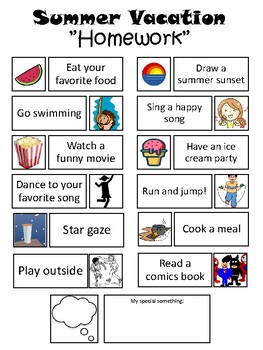
summer planner vacation activity sheet list end of year last day school activity

Summer Vacation Writing

Summer Vacation Journal( Summer Memoir): Sunflower Theme

growth mindset motiovation coloring pages summer end of year activities vacation
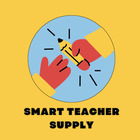
Travel and Vacation Planner { Summer Holiday Printables for Travelling}

Week One Homework Sheet

Leveled Spelling: Harcourt -How I Spent My Summer Vacation

Plan A Family Vacation : Real World Math and Persuasive Writing Skills (Digital)

Vacation Challenge Reading Log - FREEBIE!

Meine Sommerliste

Summer Bucket List Freebie

Reading Comprehension Passages 6th grade 7th 8th Morning Work Vocabulary Mystery

Field Trip Review Journal FREEBIE

Summer BUMP Addition Math Game - Freebie

2nd Grade End of Year Memory Page

Free Hard Summer Word Search Puzzle | Fun Activity Vocabulary Worksheet

Vacation /Field Trip Review Journals FREEBIE
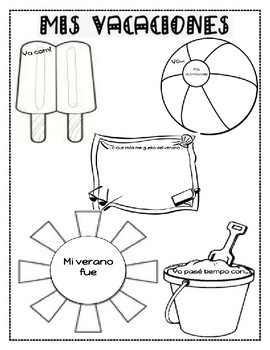
Mis Vacaciones

Mes vacances d'été | Presentational Writing | Passé composé Reporting Sheet

Back to School Activity Math Years 3-4

My Summer Reading List

Summertime Equations

Back to School Icebreaker, Getting to Know You
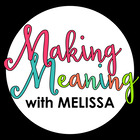
ACTIVITY MAGAZINE: Kids Extra: Volume ONE Issue 1

- We're hiring
- Help & FAQ
- Privacy policy
- Student privacy
- Terms of service
- Tell us what you think
- EXPLORE Random Article
- Happiness Hub
How to Deal With Excessive Summer Homework
Last Updated: October 25, 2021 Approved
This article was co-authored by Emily Listmann, MA . Emily Listmann is a Private Tutor and Life Coach in Santa Cruz, California. In 2018, she founded Mindful & Well, a natural healing and wellness coaching service. She has worked as a Social Studies Teacher, Curriculum Coordinator, and an SAT Prep Teacher. She received her MA in Education from the Stanford Graduate School of Education in 2014. Emily also received her Wellness Coach Certificate from Cornell University and completed the Mindfulness Training by Mindful Schools. wikiHow marks an article as reader-approved once it receives enough positive feedback. In this case, 98% of readers who voted found the article helpful, earning it our reader-approved status. This article has been viewed 36,574 times.
Summer homework has become a common theme for students. It might seem like summer homework will rob you of your well-earned vacation. However, if you make a schedule and pace out your workload, you’ll find that your summer homework doesn’t have to hamper your time to have fun with friends and enjoy the warm weather.
Making a Plan

- Gather all your assignments together and make a list of all you need to get done. Seeing the assignments clearly laid out will give you an idea of how to pace your work.

- Let your friends and family know which times you are studying so they won’t bother you.

- If your assignment is to read a book, total up the number of pages in the book and divide it into the number of days in your summer vacation. For example, if the assigned book is 360 pages long and your summer vacation is 90 days long, divide 360 by 90, which equals 4. That means you have to read 4 pages per day to finish the book over the summer. Not too bad!
- If your assignment is to complete four chapters of a math textbook, look at the practice problems for the four chapters and add up the total number. Then divide that number by the number of days in your summer vacation. For example, if there are 225 questions per chapter, that means you need to complete 900 problems over the summer. Divide 900 by 90, which equals 10. That means you need to complete 10 math problems a day to complete all four chapters by the end of the summer.

- For example, if you’re flying somewhere for a family vacation, that’s a perfect time to get a chapter read or a few math problems completed.

- For example, if your family is planning on taking a four-day vacation over the Fourth of July, mark these days off on your calendar since you probably won’t get any work done.
Staying Motivated Through the Summer

- A week off at the beginning of the summer will give you a welcome break between the end of the school year and the start of your summer workload.
- Try to do something fun to unwind during this week off.

- Most teachers won’t respond to emails during the summer, so ask your parents or another adult to see if they can help out.
- If you’re stuck and no one else is able to help, email your teacher as a last resort to see if they can aid you.

- For example, you might write “Read chapters four and five” on your index card. When Friday comes and you’ve met your goal, you might reward yourself with a movie.
- Don’t skip this step. Even little rewards will help to keep you motivated throughout the summer.

Community Q&A
- Put away your mobile devices or ask family members to hold onto them while you study so you aren’t distracted. Thanks Helpful 0 Not Helpful 0
- Put together study sessions with friends to make learning more enjoyable and to help one another focus. Thanks Helpful 0 Not Helpful 0
- Don't stress out just try to complete it slowly. Thanks Helpful 0 Not Helpful 0
You Might Also Like

- ↑ http://time.com/3964857/ap-summer-homework-tips/
About this article

Reader Success Stories
Jun 3, 2018
Did this article help you?

Moragane Baloyi
May 12, 2020
Jul 16, 2017

- About wikiHow
- Terms of Use
- Privacy Policy
- Do Not Sell or Share My Info
- Not Selling Info

- Crafts Home
- Fall Crafts
- Winter Crafts
- Spring Crafts
- Summer Crafts
- Mother's Day Crafts
- Memorial Day Crafts
- Father's Day Crafts
- 4th of July Crafts
- Halloween Crafts
- Thanksgiving Crafts
- Christmas Crafts
- Hanukkah Crafts
- Groundhog Day Crafts
- Valentine's Day Crafts
- President's Day Crafts
- St. Patrick's Day Crafts
- Easter Crafts
- Alphabet Crafts
- Number Crafts
- Shape Crafts
- Back to School Crafts
- Book Crafts
- 100th Day Crafts
- Farm Animal Crafts
- Zoo Animal Crafts
- Fish Crafts
- Ocean Animal Crafts
- Pond Crafts
- Bird Crafts
- Dinosaur Crafts
- Reptile Crafts
- African Animal Crafts
- Nursery Rhyme Crafts
- Bible Crafts
- Fire Safety Crafts
- Space Crafts
- Robot Crafts
- Fantasy Crafts
- Dental Crafts
- Flower Crafts
- Music Crafts
- Dress Up Crafts
- Homemade Card Crafts
- Paper Plate Crafts
- Worksheets Home
- Math Worksheet Generators
- Handwriting Generator
- Graph Paper Generator
- Reading Worksheets
- Writing Worksheets
- Math Worksheets
- Alphabet Worksheets
- Numbers Worksheets
- Shapes Worksheets
- Colors Worksheets
- Basic Concepts Worksheets
- Fall Worksheets
- Spring Worksheets
- Summer Worksheets
- Winter Worksheets
- 4th of July Worksheets
- Christmas Worksheets
- Earth Day Worksheets
- Easter Worksheets
- Father's Day Worksheets
- Groundhog Day Worksheets
- Halloween Worksheets
- Labor Day Worksheets
- Memorial Day Worksheets
- Mother's Day Worksheets
- New Year Worksheets
- St. Patrick's Day Worksheets
- Thanksgiving Worksheets
- Valentine's Day Worksheets
- Animal Worksheets
- Body Worksheets
- Food Worksheets
- Geography Worksheets
- Health Worksheets
- Plants Worksheets
- Space Worksheets
- Weather Worksheets
- About Me Worksheets
- Back to School Worksheets
- Calendar Worksheets
- Communities Worksheets
- Community Helpers Worksheets
- Days of the Week Worksheets
- Family Worksheets
- Music Worksheets
- Months Worksheets
- Activities Home
- Coloring Pages
- Printable Mazes
- Hidden Pictures
- Color by Number
- Kids Sudoku
- Optical Illusions
- Word Search
- Teaching Resources Home
- Lined Paper Home
- Primary Lined Paper
- Standard Lined Paper
- Themed Lined Paper
- Graph Paper
- Graphic Organizers
- Certificates
- Sticker Charts
Check out our selection of printable summer worksheets for kids. We've put together a bunch of summer worksheets that are good for kids of different ages. The summer picture matching and counting worksheets are good for preschool age children while the summer word scramble, missing letters and summer cryptogram puzzle are geared toward kids a little older. Click on any of the images below to view and print the pdf version. We hope you enjoy these summer worksheets and make sure to also check out our summer crafts for kids .
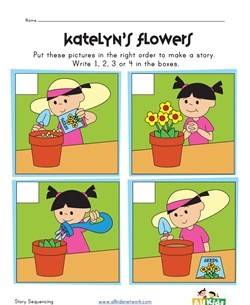
Planting Flowers Sequencing Worksheet
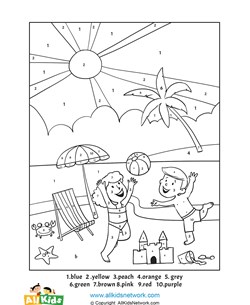
Beach Color by Number
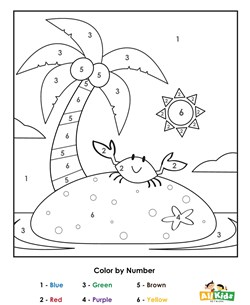
Summer Color by Number
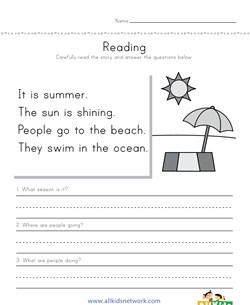
Summer Reading Comprehension Worksheet
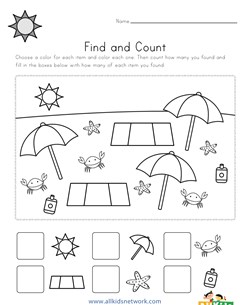
Summer Find and Count Worksheet
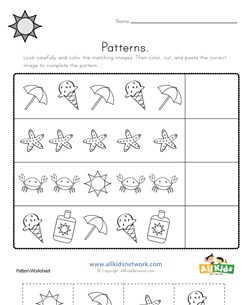
Summer Cut and Paste Patterns Worksheet
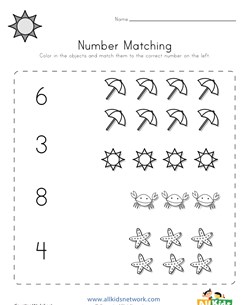
Summer Number Matching Worksheet
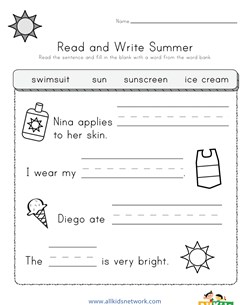
Summer Read and Write Worksheet
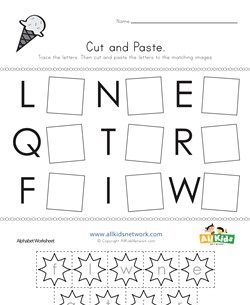
Summer Cut and Paste Letter Matching Worksheet
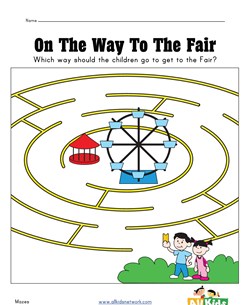
Summer Maze
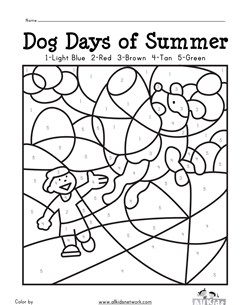
Color by Numbers
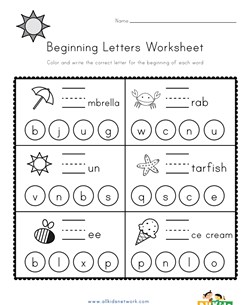
Summer Beginning Letters Worksheet
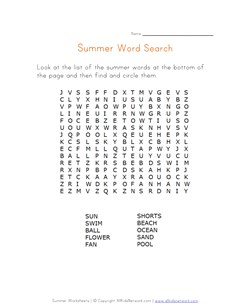
Summer Word Search
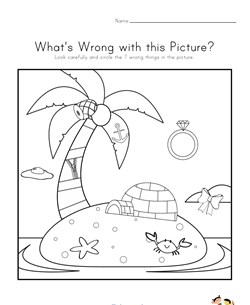
What's Wrong with the Picture - Summer
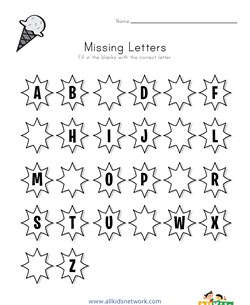
Summer Missing Letters Worksheet
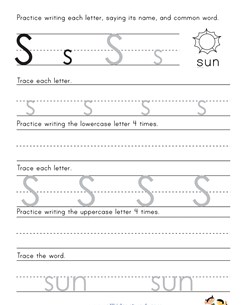
Printing Letter S Worksheet
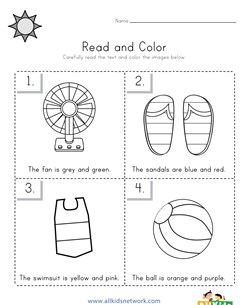
Summer Read and Color Worksheet
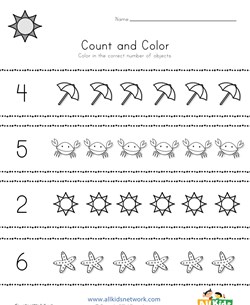
Summer Count and Color Worksheet
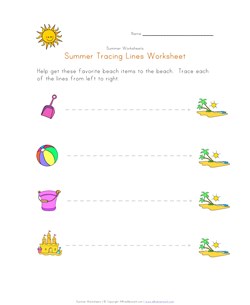
Summer Tracing Lines Worksheet
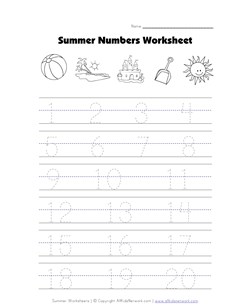
Summer Tracing Numbers Worksheet
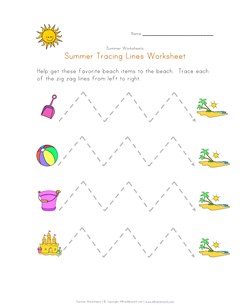
Summer Tracing Zig Zag Lines Worksheet
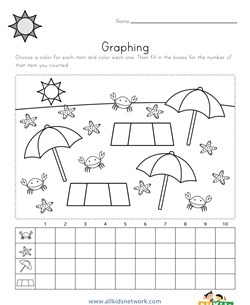
Summer Graphing Worksheet
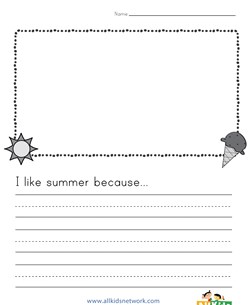
I Like Summer Writing Worksheet
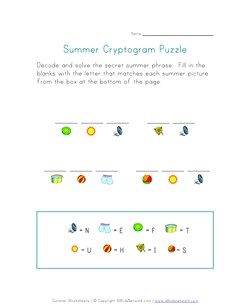
Cryptogram Puzzle Worksheet
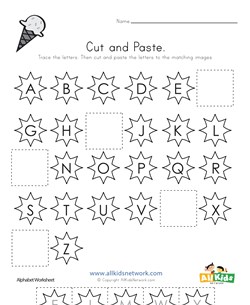
Summer Cut and Paste Missing Letters Worksheet
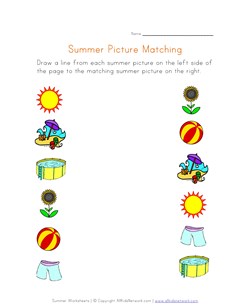
Summer Picture Matching Worksheet
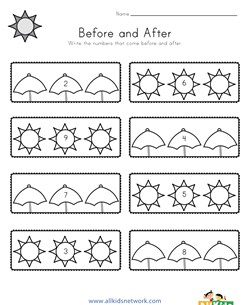
Summer Before and After Worksheet
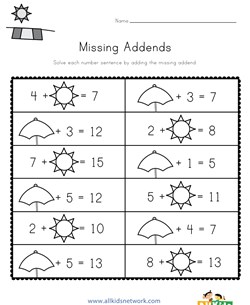
Summer Missing Addends Worksheet
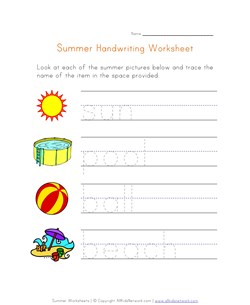
Handwriting Practice Worksheet
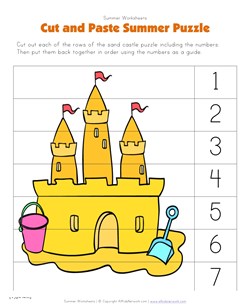
Cut and Paste Puzzle
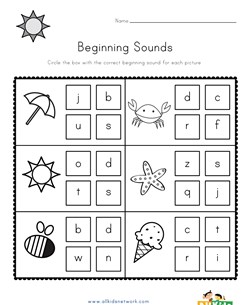
Summer Beginning Sounds Worksheet
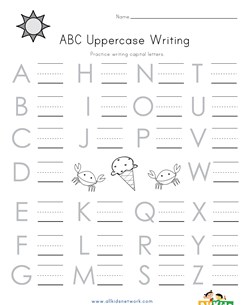
Summer Uppercase Letters Worksheet
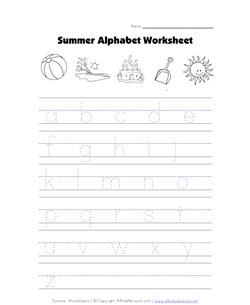
Summer Tracing Lowercase Alphabet Worksheet
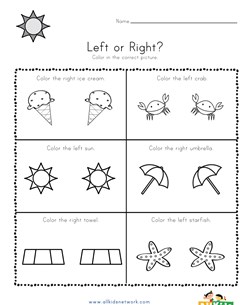
Summer Left and Right Worksheet
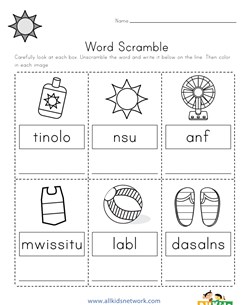
Summer Word Scramble Worksheet
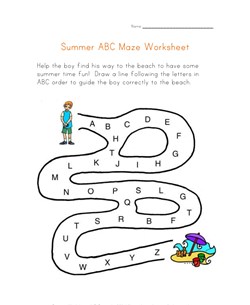
Summer ABC Order Worksheet
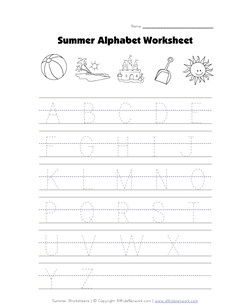
Summer Tracing Capital Letters Worksheet
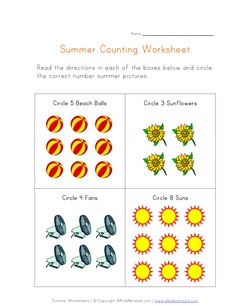
Summer Counting Worksheet
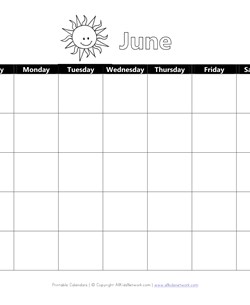
Printable June Calendar
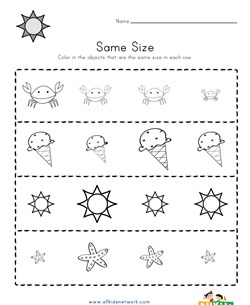
Summer Same Size Worksheet
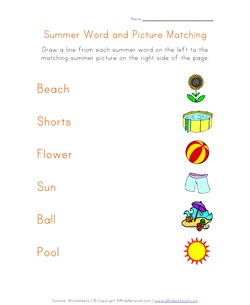
Summer Matching Worksheet
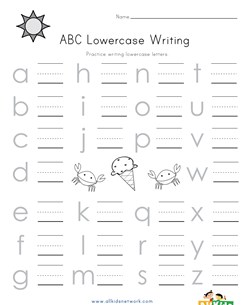
Summer Lowercase Letters Worksheet
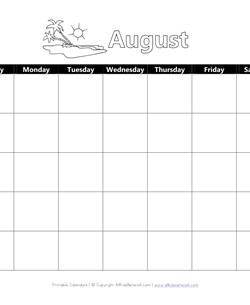
Printable August Calendar
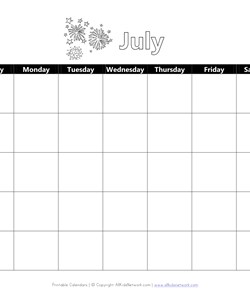
Printable July Calendar
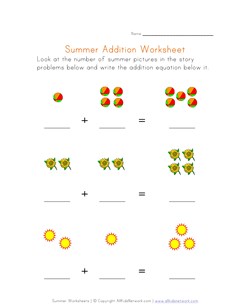
Summer Addition Worksheet
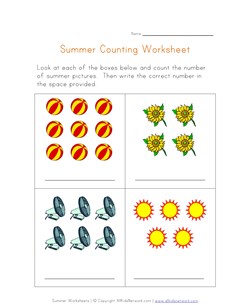
Summer Counting Practice Worksheet
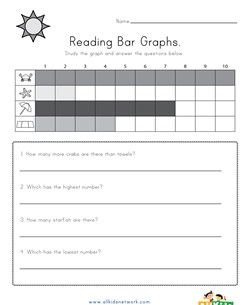
Summer Bar Graph Worksheet
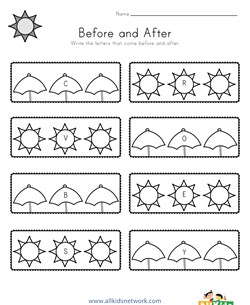
Summer Before and After Alphabet Worksheet
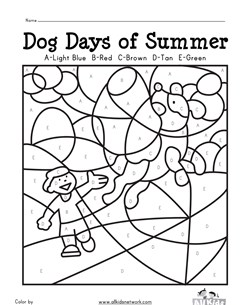
Summer Color by Letters
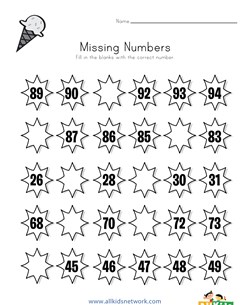
Summer Missing Numbers Worksheet
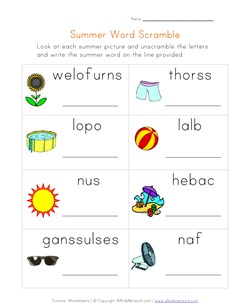
Summer Greater, Less Than Coloring Worksheet
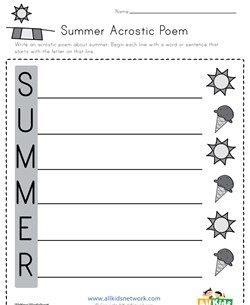
Summer Acrostic Poem Worksheet
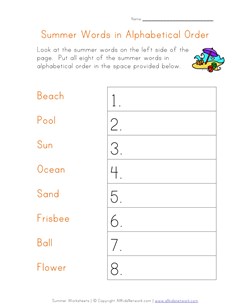
Summer Alphabetical Order Worksheet
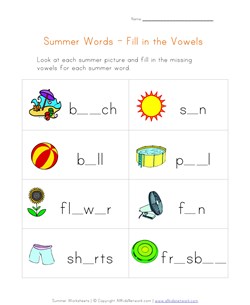
Missing Vowels Worksheet
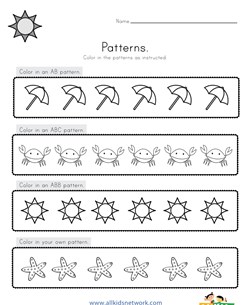
Summer Color the Patterns Worksheet
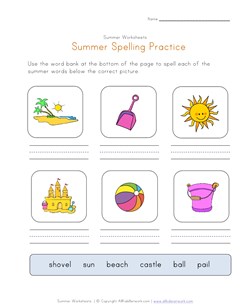
Summer Spelling Practice Worksheet
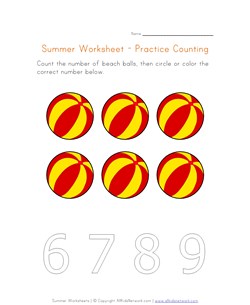
Count the Beach Balls
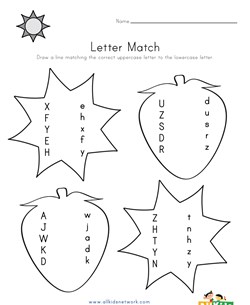
Summer Letter Matching Worksheet
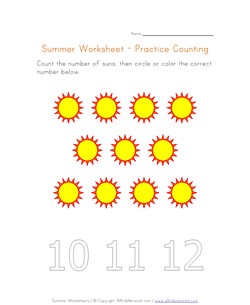
Count the Suns
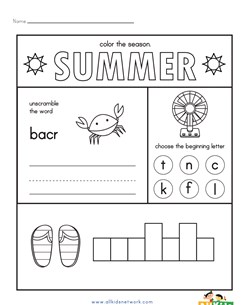

Summer Activities Worksheet
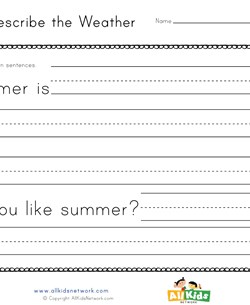
Summer Weather Writing Worksheet
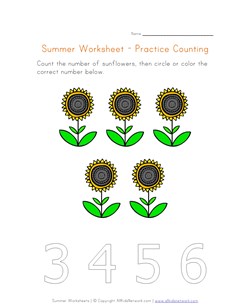
Count the Sunflowers
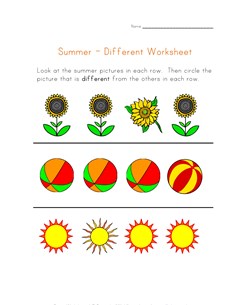
Summer Worksheet - Recognize Different Things
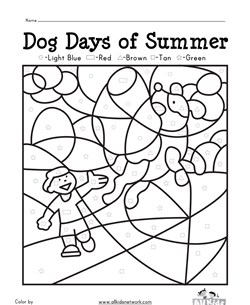
Summer Color by Shapes
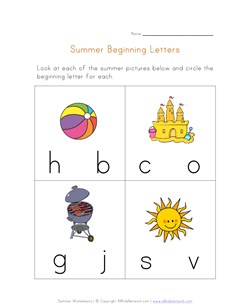
Count the Fans
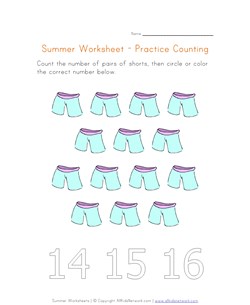
Count the Shorts
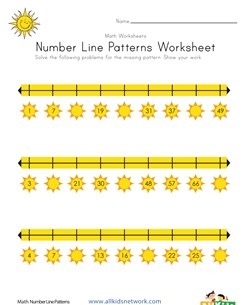
Summer Number Line Worksheet
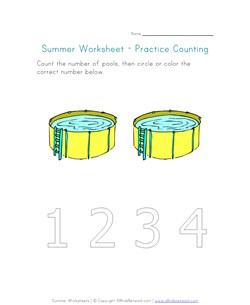
Count the Pools
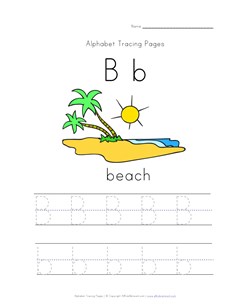
Summer Letter B Worksheet
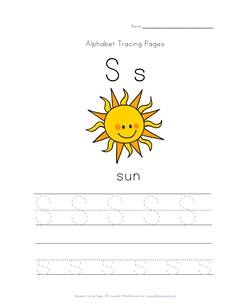
Summer Letter S Worksheet
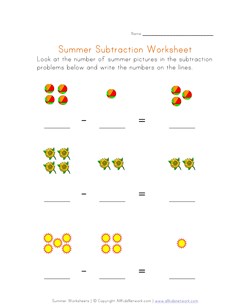
Summer Subtraction Worksheet
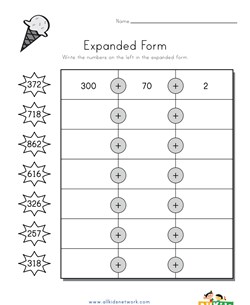
Summer Expanded Form Worksheet
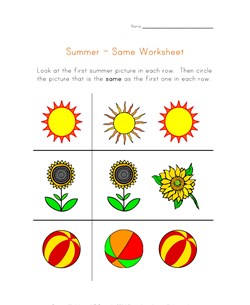
Summer Worksheet - Recognize Same Things
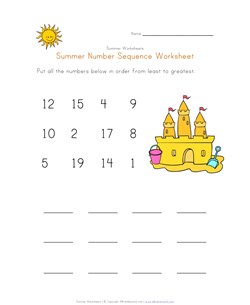
Summer Number Sequence Worksheet
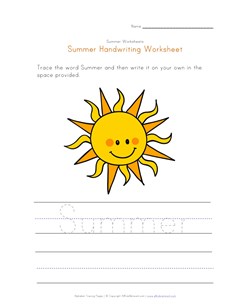
Summer Handwriting Worksheet
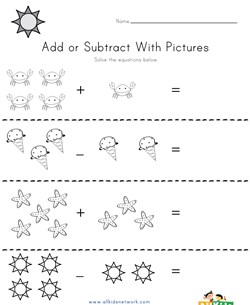
Summer Addition and Subtraction with Pictures Worksheet
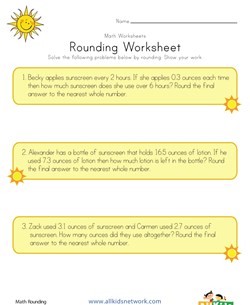
Summer Rounding Worksheet
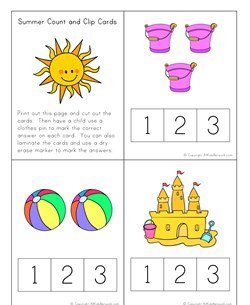
Count and Clip Cards
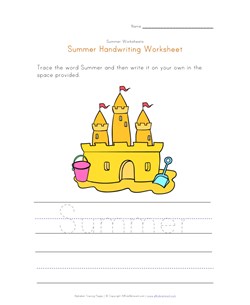
Summer Handwriting Worksheet - Sand Castle
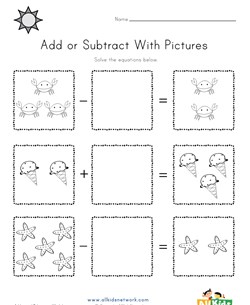
Summer Addition and Subtraction Drawing Worksheet
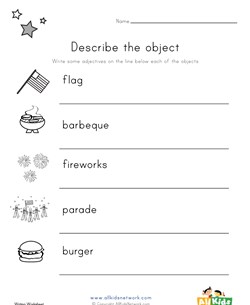
4th of July Adjectives Worksheet
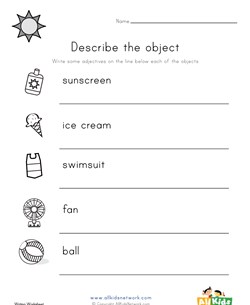
Summer Adjectives Worksheet
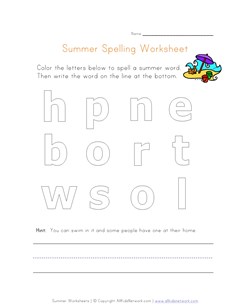
Summer Spelling Worksheet
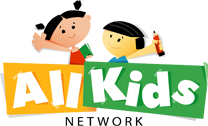
All Kids Network is dedicated to providing fun and educational activities for parents and teachers to do with their kids. We have hundreds of kids craft ideas, kids worksheets, printable activities for kids and more.
Seasonal Crafts
Holiday crafts.
- More Holidays
Seasonal Worksheets
- More Worksheets
Kids Activities
- Color By Number
- More Kids Activities
Worksheet Subjects
- Terms of Use
- Privacy Policy
© 2006-2024 All Kids Network, LLC All Rights Reserved. | Last Built Mon, 19 Aug 2024 03:53:04 GMT
The New York Times
Room for debate | the crush of summer homework.

The Crush of Summer Homework

Updated, Aug. 31, 11:45 a.m. | Harris Cooper offers more details about research on the link between homework and student achievement. Scroll down to read his added explanation .
For many young Americans, going back to school might seem like rest and relaxation. In the last week before Labor Day, how many students across the country were racing to finish their summer homework, from “A Tree Grows in Brooklyn” to math refresher exercises?
The pile of books and other vacation assignments appears to grow every year. Is all this homework beneficial or should children be given a break? An article in The Times on Sunday described a debate over assigned reading throughout the year. Some educators argue that students should be given wide latitude in deciding what they want to read, while others defended the “Moby-Dick” model. How should this issue be treated in summer, when some schools insist that everyone finish “The Old Man and the Sea,” while other schools say that “Gossip Girl” helps satisfy the requirement?
We asked some experts for their perspective, now that the summer homework is due.
- Harris Cooper, psychologist, Duke University
- Nancy Kalish, co-author, “The Case Against Homework”
- Mark Bauerlein, author, “The Dumbest Generation”
- Denise Pope, Stanford University School of Education
- Richard Allington, education professor, University of Tennessee
- Elizabeth Birr Moje, education professor, University of Michigan
- Tyrone Howard, education professor, U.C.L.A.
Forgotten on Vacation

Harris Cooper is chairman of the department of psychology and neuroscience at Duke University. There is growing concern about the summer vacation’s possible negative impact on learning. Many educators argue that children learn best when instruction is continuous. The long summer vacation disrupts the rhythm of instruction, leads to forgetting, and requires time be spent reviewing old material when students return to school in fall.
Research evidence bears out these concerns. A group of colleagues and I conducted a review of 39 studies, and it confirmed that, on average, achievement test scores declined between spring and fall, and the loss was more pronounced for math than reading. The reason for this subject matter difference is simple: kid’s out-of-school environments provide more opportunities to practice reading skills than math.
Students, regardless of economic status, lost roughly equal amounts of math skills over summer.
Also, the research indicated that the impact can differ based on a child’s economic background. All students, regardless of economic status, lost roughly equal amounts of math skills over summer. However, substantial differences were found for reading. On some measures, middle-class children showed gains in reading achievement, particular word recognition scores, over summer. Low-wealth children showed losses.
In addition, while research evidence is scarce, educators argue that the long summer break can have a greater negative effect on the learning of children with special educational needs. The long break also can add an extra burden for children who do not speak English at home. Not only might they have to relearn academic material, they also must reacquaint themselves with the language of instruction.
Read more…
With the great pressures that educators feel nowadays to help all children achieve at their optimum level, the practice of assigning “summer homework” has increased. These assignments can vary from giving kids a voluntary opportunity to get a head start reading books they will cover in next year’s English class to textbook assignments that they will be tested on when they come back to school in fall.
I know of no studies that have directly tested whether kids who get summer homework do better in school the next school year. I do know that summer school can be highly effective and summer homework might be considered a “low dose” of summer school. Of course, given that there is no teacher supervision and the hours spent on summer homework are typically much fewer than attending summer school, it is risky to leap from on conclusion to the other.
My suspicion is that summer homework can have a positive effect on kid’s achievement. But, like everything teachers do, it’ll work best if it is focused on explicit goals and is well-constructed with clearly instructions. It also shouldn’t be so overwhelming it crowds out the other activities that make summer special. Resentment is not conducive to learning.
And, parents need to be behind the effort. Some parents complain that kids must have time to be kids. Summer is the best kid-time of all. Many children go to summer camps where they learn lots of important skills not covered in school. Many adolescents take on jobs that teach responsibility and provide them with money for leisure time during the school year.
My advice? Teachers, you need to be careful about what and how much summer homework you assign. Summer homework shouldn’t be expected to overcome a student’s learning deficits; that’s what summer school is for. Parents, if the assignments are clear and reasonable, support the teachers. When your child says “I’m bored” (what parent hasn’t heard this on a rainy summer day?) suggest they work on an assignment. Kids, don’t wait until the week before school starts to think about what you need to get done.
What Homework Can’t Do

Nancy Kalish is the co-author of “The Case Against Homework: How Homework Is Hurting Our Children and What We Can Do About It.”
Summer homework sounds like a good idea…until you see how miserable a child looks as he slogs through that pile of book reports, math packets, journal entries, and other typical assignments. The summer load has grown significantly since we were kids. But a little hard work never hurt anyone, right?
Well in this case, it might. Schools should rethink summer homework, and not just because it stresses out kids (and parents). The truth is, homework doesn’t accomplish what we assume it does. According to a Duke University review of more than 175 studies , there is little or no correlation between homework and standardized test scores or long-term achievement in elementary school, and only a moderate correlation in middle school.
Do we want our children to start the year refreshed and ready to learn? Or burned out and resentful?
Some studies claim that students lose skills they don’t practice over the summer. However, if a child can’t regain his grasp of fractions with a brief review, maybe those skills weren’t taught well enough in the first place. Doing a mountain of math sheets without a teacher’s help — and perhaps incorrectly — is not the answer.
But there are a few things summer homework does accomplish effectively: It steals time away from other important aspects of learning such as play, which helps kids master social skills and teamwork. In addition, writing book reports means kids spend fewer hours being physically active, which is essential for good health and weight control, not to mention proper brain development.
Perhaps worst of all, summer homework affects how kids feel about learning and school. Do we want our children to start the year refreshed and ready to learn? Or burned out and resentful? It’s something every teacher should carefully consider.
Reversing the Summer Brain Drain

Mark Bauerlein is a professor of English at Emory University and the author of “The Dumbest Generation: How the Digital Age Stupefies Young Americans and Jeopardizes Our Future.”
To the general question of whether or not schools should assign summer homework, the answer is, “Yes, most assuredly.” What the assignment consists of will vary with the student population, but some extension of learning into vacation time is sorely needed.
The reason stems not only from the brain drain of summer and the fog of texting that enwraps youths during leisure hours. It relates also to an attitude young people take toward education. In a word, they regard learning as a classroom thing, that’s all. They tie knowledge to the syllabus, not to themselves. They read and study to write the paper and ace the test, not to furnish their minds. Learning is to earn a high score and good grade, not to form responsible citizens and discerning consumers.
Students regard learning as a classroom thing, and spend their leisure hours text-messaging. Here’s how we can deal with that.
A good measure of the attitude is how often they talk to teachers outside of class. According to the 2008 National Survey of Student Engagement, the rate of college seniors who “Never” or “Sometimes” (two or three times a semester?) discuss readings and ideas with teachers reaches 72 percent.
At the secondary level, according to the 2007 American Freshman Survey, the rate of high school seniors who went on to college (the high performers) who talked to teachers less than one hour per week came in at 53.4 percent. That’s a 10 point rise over 1987’s tally.
The free-ranging, back-and-forth conversation with teachers that signifies a student’s interest in the subject didn’t strike the majority as important. And why should it, when the system encourages them to respect only how learning shows up on a transcript or a test result?
The outcome is unsurprising. Once the assignment is finished and class ends — poof! The knowledge goes away. It’s done its work. Why retain it? This explains why on assessments of general knowledge learned in high school, college freshman often score higher than seniors. Time hasn’t yet taken so high a toll on their learning.
To halt the decay, teachers need to change the attitude. This means inserting more out-of-class engagement with teachers and materials, including summer homework, but not linking them so closely to a grade. The goal is not to pile on more tasks and instill more “achievement-thinking.” It is, instead, to make knowledge firmer, and to attach a message which says:
“Life is short, and the years of school pass in a rush. This is your only chance to encounter deep ideas and complex histories with a mentor to help you through. The works of beauty and truth are not chores to slog through. They are the raw materials of mind and character, and they should shape not only your resume, but you, too.”
Procrastination and Busywork

Denise Pope is senior lecturer at the Stanford University School of Education and co-founder of Challenge Success , a research and student intervention project.
The problem with summer homework is a lack of buy-in from one of the main constituencies: the students. During the school year, the students don’t necessarily enjoy doing homework, but they understand it is part of their daily routine. In the summer, students expect, and often need, a break from this routine and the daily pressures that usually accompany it.
Why should we care if the students are bought in? We know from research that motivation plays a central role in engagement with learning and, subsequently, student achievement. If students are given choice and voice in the learning process, for example, they are more likely to want to learn the material and more likely to retain it.
Summer should be seen as a gift, an important time to explore new hobbies, work a summer job, gain independence.
When students are not motivated, the teacher –- or in the case of summer, the parent — often needs to become part of the homework equation, monitoring, reminding, cajoling to make sure the work gets done. In my community, many parents complain that they don’t want to serve as “homework police” in the summer, and many admit that they are as frustrated as their kids when it comes to summer assignments.
One parent complained that her third grade son had to read five books and write five book reports over the summer. The problem was that he hated the books and kept procrastinating, and the stress on the child and on the entire family over the nine weeks became “unbearable.” Other parents admit that their kids wait until the very last minute to sit down and do the work, usually a day or two before school starts up again, and then they are cramming to get it all done.
I have seen the research that shows that students lose valuable skills when they are not in school during the summer months. And I worry especially about the kids who will spend most of the summer inside, in front of TVs or video games, and will be wasting the value of this free time. However, summer homework fails to serve its purpose if it causes undue stress on kids and families, if it is done all at once in a last minute rush, or if it is viewed as meaningless busywork.
Summer rest and exploration is especially important these days, given the increased pressure on students from high-stakes testing, the increase in homework during the school year, and the busy-ness of the extracurricular lives of many of our kids. Ideally, summer should be seen as a gift, an important time to explore new hobbies, enjoy the outdoors, read for fun, work a summer job, take on an exciting challenge, gain independence, and foster deeper connections with family and friends. The learning that happens during these experiences is as important as the skills and content learned during the school year.
If we want students to use this time wisely and appropriately, we ought to educate them about the benefits of summer time and encourage them — perhaps even give an “assignment” — to use the break to pursue interests of their choosing. Then, when they get back to school in September, they can write about, discuss, or present their “summer learning” in a way that is meaningful to them.
The Risk of Falling Behind

Richard Allington is a professor of reading education at the University of Tennessee, Knoxville.
In some schools, it is common for students to be assigned teacher-selected books for the summer vacation months. I know of not a single study supporting this practice, but I do know of studies showing the various methods students use to convince teachers they did the reading even though they didn’t.
A basic problem with this old, and desperate, model of summer reading assignments is that only rarely do teachers (or schools) assign books that a typical kid would ever want to read.
Low-income kids lose about three months in reading proficiency every summer.
At the same time, research has also demonstrated, including with New York City school students, that students from low-income families rarely read during the summer while middle-class kids typically do. This difference accounts for roughly 80 percent of the gap in reading achievement that exists between rich and poor kids. By grade 9 that reading achievement gap is three to four years wide.
Middle-class ninth graders, on average, read at the ninth-grade level. Low-income ninth graders, regardless of ethnicity, read at the fifth- or sixth-grade level. On average, students from low-income families learn as much during the school year as kids from wealthier families — even in New York City. But every summer the lack of reading practice produces losses in reading proficiency, while doing some reading during the summer produces small gains.
The evidence is clear that how kids spend their matters. Low-income kids lose about three months in reading proficiency every summer. That means every three years they fall a year behind middle-class kids, even when their teachers are just as effective as the teachers middle-class kids have.
Several research studies have shown that simply giving low-income children books on the final day of school can stem summer reading loss. But these books must be books they can and want to read. Our studies allowed students to select the books from 500 or so titles we had picked to match student reading levels and interests. We spent about $40 per child per summer (about the same cost as a test preparation workbook). The kids each selected 12 books, which they got to keep.
I know there are readers thinking, “Why not just have these kids go to the public library to get their book?” While public libraries are essential, and good outreach programs from public libraries can increase summer reading for all children, those efforts may not get all kids to check out a dozen books every summer.
Parents (and teachers) are right to worry about whether students read during the summer. But assigning books is about the least effective strategy to achieve that goal. It is past time for schools to provide children with easy summer access to books they want to read.
Choosing Your Assignment

Elizabeth Birr Moje is a professor of education at the University of Michigan.
The question of how to prevent summer learning loss has plagued U.S. schools for years. There is no question that some level of skill is lost or diminished for a large number of children and youth over the summer months. In many cases, these skills are easily renewed as soon as students begin school again. But in some cases, the loss chips away at learning gains; this is particularly true for children and youth who find school learning difficult during the academic months as well.
Whether assigning vacation homework would help to diminish the effects of the summer learning loss is an open question, but an equally important set of questions revolves around what such “homework” would involve, how it would be “regulated” (i.e., would students choose or would they be forced to do homework?), and how it would be supported.
In general, we know that assignments that merely drill students on basic skills is less useful than homework that supports them in meaningful thinking and activity. Summer homework, in particular, needs to provide choice with guidance, be embedded in projects or activities that have a real purpose, connect students to networks that support making sense of the activities, and ensure that youth from all backgrounds and socioeconomic levels have equal opportunity to participate.
For example, if schools want to promote the maintenance of reading skills, then they should consider assigning reading lists that offer choices. Such lists should not only promote the reading of novels, but should include informational texts, short stories, poetry, newspaper and magazine articles and web blogs in both paper and digital forms.
Providing children and youth with guided choice reduces the likelihood that they will resent being forced to do the work over the summer months; encouraging wide reading prepares them for the reading demands of upper grades by building world and word knowledge.
Schools (or parents) should also build opportunities for students to discuss the readings, either through face-to-face or on-line discussions. Offering opportunities for discussion and even application of concepts can push students to read beyond their initial preferences as they offer texts to one another, thus diminishing the need to “force” students to read particular texts.
Without discussion, children and youth may complete assignments just to check them off the list, not really engaging with the ideas or learning new critical skills or knowledge.
Another possibility for summer homework is community service or work projects where students can learn new academic skills, and also practice those they have learned during the school year. Combining the use of these skills in meaningful social and workplace activity can be motivating for even young children. This kind of “homework” is more challenging to monitor, but the benefits to young people and communities are high.
Whatever the form of summer homework, it is only a good idea if efforts are made to make it meaningful, engaging, and accessible to all.
What Low Achievers Need

Tyrone Howard is an associate professor at the U.C.L.A. Graduate School of Education and Information Studies.
The utility of homework has been a sacred cow in many education circles for years. I think homework has become a practice that has continued on because it has been normalized in educational behavior. Homework should help to reinforce content or materials that teachers have taught or covered in class. But in many cases today, homework has been reduced to busy work that posseses minimal value in developing deeper understanding.
That said, assigning summer homework is a good idea in theory. Some researchers have documented that some students lose grasp of key reading and mathematical principles when they have not used them for a two to three month period.
A better approach than homework is to have more intensive, small learning community-type summer school programs that last four to six weeks.
But the issue becomes one of accountability and reinforcement of understanding. If teachers cannot get students to turn in homework during the school year, when they see them every day, what is the likelihood that they will get them to do it, and with accuracy, when they do not see them?
I do think that there is a need to reinforce key academic concepts and skills, especially for lower achievers, who tend to be students of color, and students from poor backgrounds. A better approach than homework over the summer is the more intensive, small learning community-type summer school programs that last four to six weeks. These programs allow students to have access to teachers in a smaller learning environment for three to four hours a day. The benefits, I believe, would be far greater than more mind-numbing homework.
Homework and Achievement
Harris Cooper offers more details about the link between homework and student achievement:
Homework’s effect on achievement is best gauged by experimental studies comparing students who are purposely assigned homework with students purposely assigned no homework but who are similar in other ways. The results of such studies suggest that homework can improve students’ scores on the class tests that come at the end of a topic. In five such studies, students assigned homework in 2nd grade did better on math, 3rd and 4th graders did better on English skills and vocabulary, 5th graders on social studies, 9th through 12th graders on American history, and 12th graders on Shakespeare.
Less authoritative are 12 studies that link naturally-occurring (not manipulated) amounts of homework to achievement. On the positive side, these studies used sophisticated statistical models to control for lots of other things that might influence the homework-achievement connection. The controlled factors have included the student’s ability level and family background and the teachers’ experience. These studies have the added advantage that they are often based on national samples and use measures of achievement such as grade point averages and standardized tests. They find a similar positive link between time on homework and achievement. But most of these studies were done with high school students.
Yet other studies simply correlated homework and achievement with no attempt to control for student differences. In 35 such studies, about 77 percent found the link between homework and achievement was positive. Most interesting though, these results suggested little or no relationship between time on homework and achievement for elementary school students. These inferior studies are at odds with the more trustworthy experimental studies mentioned above. But, if we assume that the experimental studies involved relatively short assignments, they do suggest too much homework for young kids might not be a good thing. (Too much homework might also not be good for adolescents but studies show assignments can be longer before reaching the point of diminishing returns.)
Comments are no longer being accepted.
When I was fourteen years old, I was working almost 60 hours a week. This is because, on top of the 40 hours of work we did at school, our teachers each assigned us one hour of homework per night. Four classes, times five days, equals another 20 hours of work.
I was conscientious enough to do this work; most of my fellow students blew it off, of necessity. If you were going to play a sport, or an instrument, or even have a social life, you had to. I barely had time after school to go for a quick run for fifteen minutes, and to wash the dishes after supper. That’s all I did, besides schoolwork.
This was not good for me or my fellow students. For the people who didn’t do the work, it taught that you could just blow off responsibilities. For me, it taught me that if I obeyed the teachers, I couldn’t play music, or a sport, or goof off at all after school.
I say: structure school so that the necessary work can go on during school hours. And for goodness sake, leave kids alone during the summer!!
In the summer children should be running and playing and swimming and camping and learning important interpersonal skills by creating activities of their own with their friends and sometimes peers who are not so friendly. They should go to the library and read as they please, IF they please. Travel to new places. Structured activities stifle creativity and stunt natural thought processes. Looking at the sky or a bug or a leaf or just day dreaming are not uselss activities. Time to wonder is VERY good for developing minds.
Think of all the inventors in our history who must have had time to wonder, “What if…?” Maybe Edison wanted to read into the night and the light of a candle wasn’t enough. Ben Franklin must have been curious about lightning. DaVinci must have been curious about everything. Children don’t have to have ALL their time regimented in order to become well educated. What is wrong with our society that we want to take the joy out of EVERYTHING?
No. Homework should NOT be assigned during the summer. But when it is assigned during the school year, I feel that discussions of homework should focus on the quality of the work instead of on the quantity or time limits set for it. For example, if homework was not graded and used only rarely and only when it really helped turn the kids onto learning, it could be a useful tool.
Too much homework that my own kids have done in the last ten years has been bland, non-creative, non-inspired, teacher-assigned busywork. Most of it seems to be about how well kids can follow the teacher’s directions, instead of how well kids can think for themselves. Is this really the best way to prepare our kids for the 21st century?
Check out my blog: East Bay Homework Blog – //eastbayhomework.blogspot.com/ and check out the film Race To Nowhere, //www.RacetoNowhere.com
The problem with summer homework is that there is little supervision or help. The children will do the works, but they’ll forget about them soon afterwards. If we really want to get serious about summer memory loss, we should send our kids to summer schools or tutoring.
I think it is more pertinent to ask what the purpose of such assignments is. If you are trying to inculcate a reading habit amongst these youngsters, you are a far way off. Burdening them with reading assignments is never going to work. This is particularly true of specified readings. I think it would be a better approach to let them set their own targets, of course after stipulating a bare minimum. Homework help at aafter.com
My answer to this question in general is NO. I am a rising junior at Bronx Science and I am dreading it. I have homework for three different classes. About 28 essays for AP US History , English assignments plus Research assignments as well. By going to this tough school, the school year is a pain in the glutens! i was hoping i would be able to relax and unwind my mind this summer by focusing on what I plan to do in the future but doing all these things inhibits my brain functions of thinking like a normal teenager. It is so sad teens who go to this school miss out on all the joy of being a teenager. It just sucks big time, I would rather write articles for the NYT criticizing anything in the world, besides doing summer homework!
I remember my days of school in India where the students would go to 4-6 hours of private tuitions everyday to try to finish their whole syllabus for the entire year BEFORE school even started just to get an edge.
So, if the US wants their kids to compete, assignments are hardly even enough ( bare minimum if you ask me)
Or you could just go on as always and hope for the best. The immigration policies have already made it impossible for International students with advanced degrees ( like me) to get jobs. Maybe that will protect American kids in the future too.
Yes, mandate summer homework if you want to train children to be available to their “job” every day, all day, even when they’re not compensated. (The new global economy!)
If I take a vacation, I expect to be on vacation. Children should have the same expectation of their free time. If educational theorists wish to create interesting, multi-sensory experiences (i.e,. camp, travel, nature walks) into the summer for a certain group of children, go to it. But, lay off the required summer reading lists, book reports, etc. It’s absurd. Children need more play opportunities, which will help them grow and mature, and give them a necessary break.
Nancy Kalish makes it seems like if kids have hw, they can’t go outside and have fun. There are 24 hrs in a day. It’s not like you would be spending 8 hrs a day doing summer hw. There is plenty of time for both. If you set aside 2 hrs a day for summer hw, that leaves the child 22 hrs to sleep, play and eat. I don’t see how those 2 hrs of hw would hurt the child.
I have taken summer school since I was in second grade. Every summer from June till 1.5 weeks before the new school year, I was in city summer school. I took two classes, one fun and one academic from 8am – 3pm. I do not know whether I would lose my math or reading skills over the summer since I was utilizing them year around. I am not good at math. If I didn’t take summer school, I am pretty sure that I would forget math pretty quickly. The subjects you don’t enjoy, you forget the fastest and the easiest.
I do not think that a math homework packet and doing 2-3 book reports during the summer for a third grader is unreasonable. The teacher could have a list of 50 books that the child could select from.
Children in American have 2.5 months of free time. 2.5 months to do 2-3 book reports and a math packet isn’t very much. The child procrastinating is the parent’s fault. It is up to the parent to make sure that the child is on track with his or her learning and homework. If you let your child wait until the last minute to do the homework, you are causing your child undue stress.
It is not a strange a idea to have the child set 1/2 – 1 hr a day to read. Maybe instead of video games or playing with the computer, the child could read a book.
Summer hw is done in other countries as well. In Japan, every kid has summer homework.
One size doesn’t fit all. Some kids may well benefit from summer homework, but others won’t. I expect that this would work best when the student has a role to play in selecting the assignment, or at least a choice from several alternatives.
Children can run , play and swim on the weekends. School should be 12 months a year. I think how different my life would have been if it hadn’t been for that 3 months of mostly inactivity with nothing to challenge the mind but countless rounds of gin rummy, and getting into trouble with the neighbor children. There can be JOY in learning. Nowadays, there is too much JOY in drugs, alcohol and trouble from neglect . Save our children, keep them in school.
Commenters ## 1 and 2 get it.
But the dramatic idea of Richard Allington, to give students a few books of their choice — any choice — sounds just right to me. If they take the books, it’s their lookout to read them or not. And since they have them right there, and chose them for themselves, they’re likely to read at least some. Without pressure. That’s what reading should be.
In many countries with higher achievements for children in school. The summer breaks are even longer. The method to fix education in the US today is not to make kids study all the time but to fix the US education system. Children need room to grow, by doing other things. Do we want happy kids or workaholics?
Summer homework and assigning things over breaks in general is a bad idea. My senior high always gave summer assignments which I of course procastinated on, so all summer I was stuck with the guilty feeling that I should be working on school work and parents who were happy to remind me. All this did was make summer less fun and strengthen my ability to ignor the “I should be working” feeling.
Kalish is spouting complete nonsense. She is a direct threat to American competitiveness, a living example of technological regression.
My son completed first grade in both Japanese and American schools. At the end of the first grade, the two curricula were even in mathematics. Then the American first graders had 3 months of nothing. The Japanese first graders had 6 weeks with daily maintenance homework. The American kids will never catch up.
You don’t need a Duke study to identify the source of the lag between the U.S. and Japan.
My son is now finishing the summer break of 4th grade in Japan. Over the last six weeks, he has completed about one hour a day in maintenance homework for mathematics and language. He has also completed two small projects, a one-page ‘newspaper’ and an art project, just enough to keep his hand warm. The projects were selected from a list of 100+ provided by the prefecture. For this list, the prefecture gathered the cooperation of fire departments, police departments, water departments, parks and museums to provide a selection of subjects. Most of the cooperating organizations will exhibit childrens’ projects during September.
And my son still has had plenty of time for TV, Legos, games, play at the childrens’ hall and travel – and to sing the Star Wars theme song, the Indiana Jones theme song, or any other ditty that comes to mind.
The above conversation either assumes or fosters the notion that a summer vacation is a given; a necessary recharging of the batteries; a time for play and socialization. I suggest that we rethink this long-standing and almost uniquely American tradion in light of our demonstrable educational distance behind so many other countries.
Now, I am not arguing that play and socialization are unimportant, but that we consider other ways of structuring our educational system that would allow for both play and continuous learning. I am not a professional educator, although I did a great deal of techincal teaching throughout my career, but my experience tells me that segmenting learning into distinct modules of extended, intense learning followed by extended, intense periods of play is not efficient. Education, like the learning it is intended to impart, should be an integral part of life. It should, among other things, develop a strong sense of its own value because it is a part of life, not just something to be done during rigidly specified times to satisfy rigidly specified requirements. All of life is about learning, whether from books or on the playground, and is a continual process.
Our education system should be year-round, with more, shorter breaks. I would argue that the same should be true of our work environment, but let’s leave that for another time. What I think is important, even crucial, is that learning be a continuous, integrated process – as it is in real life.
If summer vacations were not so long, kids wouldn’t need the additional homework over their breaks. The number of in class days per year keeps shrinking and it’s little wonder why other countries with longer, more continuous school years outshine our educational system.
Rather than having a long, continuous stretch of summer holidays, why not have school all year round, with more smaller breaks?
Joy can still be in learning–but often isn’t, in typical school assignments. My 8th-grade grandson (in a different state) will start school today (8/31) with his summer homework done–but only because a diligent parent worked with him and made the learning sessions –well, not necessarily fun, but reasonably enjoyable.
That said, there are often summer school enrichment opportunities -or chances for fun and learning through park district, YMCA, day camp, library events and well-planned reading programs with corresponding activities (my public library invites kids in on certain days to read to therapy dogs…reluctant readers often enjoy snuggling with a friendly pooch and reading aloud to the dog…
Unfortunately, too many parents are time-stressed and work stressed – if they haven’t lost jobs because of the economy – too many grandparents (like me) are at least 1000 miles away from their grandkids, or I’d help with the summer homework to make it fun and interesting… and well-meaning, well-intentioned parents who’d like to get involved just may not have the money to do the extras like museums, vacations, music lessons or group playing-instruments, or even, if appropriate and desired, vacation Bible school.
These things come with fees–and often, lack of public transportation. If it’s a choice between food on the table, often because a parent has a part-time or second job, and registering a child for a learning activity, I do understand why the homework or enrichment doesn’t happen.
I haven’t any answers – even taking a child to a nearby public park often requires time a working parent doesn’t have. That said, sometimes agencies have programs that parents can seek out and get their kids into–reasonably. For instance, my Chicago suburb’s community college offers Kid Zone enrichment things that are learning, but fun, for what in the suburbs seems a reasonable, modest price. Art activities, field trips, science stuff, music (“bucket band”) etc. Trained college and high school students are the leaders, supervised by adults, of course – but these give kids something more constructive–and, what’s best of all – FUN – during summer vacation.
Jan Bone, Palatine IL
Sometimes I wonder if school is just a way of breaking a person’s spirit in order to prepare them for a lifetime of desk work. I was raised in the 1960s, when kids had actual lives and were not sent to Japanese style cram schools, Kaplan prep, or hothoused in any way. During my free time, I ran, learned to balance on a 1 inch wide fence, collected sea creatures and put them in a bucket, dissected plants, stared deeply at bugs, learned to share my toys, played “war” and cowboys (no Indians, we all had six guns, even the girls), made clothes for Barbie, and learned to knit from a 70+ year old woman who told me about what brooklyn was like at the turn of the 20th century. Try to get that with some professionally trained “child development” type who wants to make sure your flow of social studies, whatever passes for math, or texts with pictures of plants and bugs.
This is simply more proof that a school schedule designed around a farming culture ( that we no longer practice) is ill equipped to support us in our current culture. The amount of knowledge necessary to succeed has gotten multitudes larger while the amount of class time available has increased only marginally. Summer assignments need be an option for children who are doing academically well, but a requirement for those who are not.
Kids aren’t reading enough? I must have missed those 1 mile midnight lines for 800 page Harry Potter books. However in the Dumbest Generations Author’s defense I’m sure the older generations used their summer time much more wisely than these idiotic spoiled children by spending every summer vacation day reading Tolstoy, going to math camps and volunteering at the local hospital.
Speaking of which kids aren’t proficent in math? Well maybe that means that they aren’t smart enough to come up with “fullproof” math equations that explain how the value of worthless securites are actually AAA bonds.
The kids today are alright. They are definitely harder working and more service oriented than my generation. Went back to college recently and thought it would be a breeze but the caliber of students being produced is alot better than it was just 15 years ago.
I wonder if time spent staring at the ceiling, sorting interesting colored pebbles on the beach, reading a few low-brow books and building tree houses provides something fundamental and invaluable to a child’s development? There is no denying that skills developed during the school year become ‘rusty’ and it would seem that the brain (certainly in the case of my children) re-wires and relegates unused skills into a fog. However, the summer break is a time during which a child is truly free of the formalized process in school in order to drift freely in his or her imagination. This stated, the television (and computer) should be left off and the child sent outdoors (it is summer afterall!). Looking at the responses of the ‘professionals’ in this column, it is clear that there is no consensus.
I think homework is way overdone. I think a ton of homework is mindless busy work that de-motivates poor students and is an unnecessary drain on motivated students.
I don’t care about scientific studies. If you look carefully at how most social research is designed, it is virtually always designed to get the results the study designers are looking for. A friend of mine did his PhD dissertation at the U. of MI, back in the early seventies, a quantitative, scientifically rigorous study of research dissertations — and proved that study designs heavily influence, and usually determined, results.
People who want to prove that homework is beneficial design, unconsciously, studies that will prove what they want to prove.
I am increasingly discouraged by the steady decline in education in this country. The challenge of poor performing students cannot be met only in the classroom. The quality of children’s lives outside of school is in steady decline. Americans work many more hours than Western Europeans, meaning parents spend less and less time with kids. The economy continues to drain the middle class, requiring both parents to work longer and longer hours. Kids end up passing their one precious life, their one precious childhood in front of televisions, online, tweeting and texting.
Kids — and parents — need meaningful quality time, with themselves, with their parents.
I’d like to see a study that compared what great academic student stars do in the summer compared to the kids whose math and reading skills atrophy in the summertime. I bet that study would prove that kids with a rich quality personal/family life do lots of educational things in the summer only they think they are just having fun.
I grew up in Chicago. Every week of every summer vacation while I was growing up, my dad took his kids and some of their friends on an outing in the city. My dad was very proud of all the wonderful institutions in a great city like Chicago and he seriously considered it part of his job as a parent to expose his children to everything. The only thing my dad didn’t care to do with us was take us to art museums . . . but my mom is an artist and she covered art. We didn’t just go to the science museum once in our childhood: we went several times a year. Plus the dinosaur museum. We went to the zoos countless times each year. Parks, amusement parks, the beach, the forest preserves that ring the city.
Not that many of the other kids in my neighborhood did stuff like this with their folks but, fortunately, in our Catholic Irish ghetto, most kids joined the boy or girl scouts and went on good outings that way.
What do parents do with their kids these days? It seems to me that parents don’t often spend lots of time just hanging out with their kids.
My kid and I had fun when we weeded the garden together. My kid and I had fun driving to the lumber yard and planning her new shelves, discussing the design, the measurements, getting her to participate. When we first went camping together, just me and my young daughter, as soon as she learned to read, I would have her navigate our way from the entry to the state park to our camp site. . . that was her first lesson in map-reading. Gradually, I encouraged her to plot all our routes, when we took interstate trips in the car, let her navigate the whole thing. The first time I took her to NYC, we flew there but then rented a car and she was very proud to be able to navigate us around that city.
I began to teach her how to count in the grocery store. If she wanted to buy apples, I began by saying “we will buy as many as you can count’. The first time we had a math lesson in produce, we only bought one apple. . . but then she immediately made sure she learned how to count higher so she could buy more apples.
I began to teach her how to reach in the grocery store, too. She was always begging me to buy stuff I didn’t want to buy. but then I thought of this trick: I would show her what the letter ‘C’ looked like, point her towards the breakfast cereals and promise to buy Cheerios if she could find a box where the product began with a ‘C’. This worked well for a long time. I say it worked because I never wanted to buy commercial cereal. Cheerios, which many parents consider one of the better, more healthy ones, is still loaded with sugar and cheap unnutritious carbs. It took her a long time to distinguish all the symbols and images on cereal boxes. But she figured out strawberry jam fast. The s was easy, the red jam was easy, the jars were low and easier for her to read.
I didn’t turn every minute of time with my kid into a lesson but pretty much every minute I spent with my kid was educational. I was always trying to think of ways to get her to pay attention, to get her to think about what she saw.
Actually, I used to be an art docent and the main goal for the tour program at my old art museum was, simply, to get the children to look closely, to try to see what really was on the canvas, to get them to see and think.
I made it a point to take my kid to a museum at least once a month. I also committed to taking her to an arts performance once a month. Cities are chock-a-block full of free arts experiences. Public concerts, theater in the parks. I know the economy is tighter these days, there are less free things. . . but the world is still stuffed with free or almost free great things to do with kids. There are always parks, free to walk in. Hills to climb. Neighborhoods to walk and observe. Bird watching is free.
In the third grade, Charlotte, a little girl in my daughter’s class had a very small birthday party. She was allowed to invite two other girls. The party? The girls went butterfly hunting with Charlotte’s mother and at the end, the girls had peanut butter and jelly sandwiches and apple slices. That was the whole party.
Our whole society keeps trying to turn everything into metrics, worshiping the god of data. It is almost meaningless to discuss the value of summer homework if you aren’t going to discuss how children and their parents spend their summers. Our economy, which worships corporations and not humans, does not need all its citizens to be multi-dimensional, well-developed human beings seriously pursuing happiness. Our economy wants mindless wage slaves that pretty much act like cogs in the corporate machinery. Wool-gathering does not benefit the bottom line plus it is time most parents could be putting pins in widgets at the plant. Mindless wage slaves don’t become parents who have fun hanging out with their kids and exploring the world together.
If most kids spent their summers having close, loving, fun interactions with their families, their math and reading skills would not atrophy over the summer.
Let the children have summers free. It is a time when they can learn a lot of things that are not taught in the classroom. Family and friends relationships, exploring the world a bit without having to worry about tomorrow’s book report (in other words, reading a book for its own value, not in order to get a good grade).
Walking in the woods, or in the streets. Playing with the cats and dogs. Helping the folks with household work.
The so-called experts who evaluate “success” based on test grades are out of touch with reality. In my pre-collegiate school days, 1955 to 1967, there were many fellow students who weren’t stellar in their academic achievement levels. Yet more than a few of them have gone on to have interesting, productive, and successful lives. In some cases, very successful lives. Predicting success cannot be based just on GPA and SAT scores. Success is based on much more than the numbers.
What's Next
- International
- Education Jobs
- Schools directory
- Resources Education Jobs Schools directory News Search

Summer Holiday Homework Ideas
Subject: Cross-curricular topics
Age range: 7-11
Resource type: Worksheet/Activity
Last updated
22 January 2024
- Share through email
- Share through twitter
- Share through linkedin
- Share through facebook
- Share through pinterest

20 home learning ideas for the summer break. Tasks are varied, including: writing, math, creative and social-emotional skills.
Provide as a handout for children to select from. Why not challenge children to complete 3, 4 or 5 of their choosing?
Some tasks could be useful for new term display or presentation.
Creative Commons "Sharealike"
Your rating is required to reflect your happiness.
It's good to leave some feedback.
Something went wrong, please try again later.
TES Resource Team
We are pleased to let you know that your resource Summer Holiday Homework Ideas, has been hand-picked by the Tes resources content team to be featured in https://www.tes.com/teaching-resources/blog/top-summer-holiday-activities-primary in June 2024 on https://www.tes.com/teaching-resources/blog. Congratulations on your resource being chosen and thank you for your ongoing contributions to the Tes Resources marketplace.
Empty reply does not make any sense for the end user
Thanks for sharing
Thanks for your feedback!
Use with caution - in this current financial climate, this pack of homework ideas could potentially exclude families that do not go on holiday or have do not relationships with their (extended) families. Not all children have a 'good' summer break. For those that do, it is great.
Thanks for your feedback. This resource has been updated.
Report this resource to let us know if it violates our terms and conditions. Our customer service team will review your report and will be in touch.
Not quite what you were looking for? Search by keyword to find the right resource:

Richard James Rogers
Educational articles and advice for teachers. www.amazon.com/author/rogersrichard

Should We Set Homework for the Summer Vacation?
An article by Richard James Rogers (Author of The Quick Guide to Classroom Management )
Illustrated by Pop Sutthiya Lertyongphati
It won’t be long until our students (and us) will enjoy a long summer vacation. Sand, sea, sleep-ins and more time with the family. Sounds great!

In the UK, schools will close around mid-late July and reopen in early September. In America the summer holiday is much longer. Take New York , for example: Schools there will have their last day on June 26th, with students returning on September 5th.
Some teachers and parents would say that young people need this summer vacation to rest, have fun and basically enjoy being a kid. Others would say it’s too long to be away from school work entirely, and some learning should still be taking place.

I say that it all depends on the age and needs of the individual students.
Start planning now!
During this article I hope to convince you that the summer vacation can be used to our advantage. Effective teachers have used the summer vacation for decades to act as a ‘buffer’ – a chance for slower students to catch up; for able, gifted and talented students to be pushed even more; and generally for getting a little more material covered so that the new academic year can start a little bit ahead.

However, in order for me and you to effectively make use of the summer vacation (so that our students benefit), we must start planning now!
Case #1: The exam-preparation class
Let’s say that you’re taking a group of students through a two-year course (such as the IB Diploma, IGCSEs or ‘A’ – Levels).
In an ideal scenario, those two years would be broken up as follows:
Year 1: Cover as much content as possible (at least 60% of the syllabus). Complete all coursework if the timetable permits.
Year 2: Finish off any remaining content. Allow as much time as possible for revision and past-paper practice.
I believe that a good way to get our kids to be ahead of the game before Year 2 is to set them a significant piece of summer homework that is achievable, but not too onerous.
I’ve found the following tasks to be effective (sometimes I combine them both together):
- Provide a booklet of notes and questions covering a topic that the students haven’t studied yet. When they get back to school after the summer, collect the booklets in. Check those booklets to make sure they are completed. Peer assess them and provide a one-week condensed summary of the topic in your lessons. Keep a record of who has and hasn’t scored well on the content, and intervene where necessary (e.g. with some after-school classes).
- Give students a test on a topic they learned over the summer. Provide notes for the students to revise from. Analyse the grades and help out any students who haven’t performed well.
When both of these techniques are combined together powerful and deep learning can take place over the summer. This can give our students a head-start in Year 2, giving them more time to do revision and past-papers.

Case #2: Able, Gifted and Talented Students
These are students who we really want to push and encourage.
The summer vacation is a long-time to be away from formal education, and we don’t want these students to lose momentum or interest.
I’ve found that project work is particularly useful for these types of students. I usually set work based on the following procedure:
- Find out what the student is really interested in. What does she have a passion for? (For example: hip hop dancing)
- Think of ways that you can link your subject area to the student’s area of interest (For example: A project about vector mathematics as a model for the movement of a hip hop dancer during a routine)
- Discuss the project with the student. Make sure it’s relevant and deep. Ask the student to come up with ways to process the information and present the final output. Perhaps a stop-motion animation will work well. Maybe the student prefers to do a performance. Maybe a project portfolio will work well.
- Offer some kind of significant reward and recognition for the effort. Discuss the benefits (e.g. how this project will improve subject knowledge in a particular area). Speak with senior management about any material rewards that can be given (e.g. book tokens, medals, certificates or a trophy).
- Follow through and keep our promises: We must make sure that we honour our promises to these students. If we’ve promised a medal, then we must damn well make sure that the kid gets a medal. If we’ve set the work, then we must fulfill our professional duty by giving feedback.

Case #3: Students who are falling behind
I’ve reached a stage in my career now where I just cannot allow poor performance to go unnoticed or unchallenged. It just bugs me too much.
For kids who haven’t been performing well, a good sit-down and chat with the students and their parents is an absolute essential before the summer, in my honest opinion.
Let’s say that you’ve had a biology student for one year and she just didn’t understand cells, human body systems and plant reproduction. Let’s say that this student failed all three tests for these topics.
If this student has not been given the opportunity to re-sit tests in these topics throughout the academic year, then it is our duty, I believe, to ensure that this material is covered over the summer. The student will have more time and, provided that the parents are aware and involved too, this should result in regular, productive revision and an increase in subject knowledge.

I’ve found the following techniques to work well for students who are falling behind:
- Analyse the assessment data for the whole academic year. Identify the area or areas in which the student is performing poorly.
- Look through all of the student’s work that you have to-hand. Is there any particular method or output that the student is really good at (e.g. website creation, drawing diagrams, making infographics, etc)?
- Meet with the student and his/her parents. Discuss a way forward over the summer that involves the student completing meaningful work on the topics of weakness through an output that appeals to the student’s preferred learning style.
- Check that the quantity of work is neither too much, nor too little
- Decide on a way to assess the work
When planned properly, our summer holidays can become times when our under-performing students really turn their lives around and gain a renewed sense of purpose and confidence.
Schools not ‘out for summer’ (sorry).
The summer vacation offers a powerful way for us all to push our students forward, allow our students to cover extra material and address weaknesses for those students who are struggling.
This all involves some planning, though.
I don’t know about you, but when my students break up for the summer in one month’s time, I’ll be ready. I’ll have had my conversations with parents, kids and SLT and my students will know exactly what to do in the months approaching the new academic year.
We owe them that.

We welcome you to join the Richard Rogers online community. Like our Facebook page and follow us on Twitter for daily updates.

Share this:
Author: richardjamesrogers
High School Science and Mathematics Teacher, Author and Blogger. Graduated from Bangor University with a BSc (Hons) degree in Molecular Biology and a PGCE in Secondary Science Education. Richard also holds the coveted Certificate in Mathematics from the Open University (UK). Richard is the award-winning author of The Quick Guide to Classroom Management: 45 Secrets That All High School Teachers Need to Know View All Posts
2 thoughts on “ Should We Set Homework for the Summer Vacation? ”
Hi Richard. I really enjoyed the summary / article and I’ve posted it to the whole school. Just a very simple and straight forward synopsis of what it takes to get something (student progress) from nothing (holidays). Thanks again, Ian
Thank you very, Ian. I’m really glad that the article was useful. Where is your school based?
Leave a Reply Cancel reply
Discover more from richard james rogers.
Subscribe now to keep reading and get access to the full archive.
Type your email…
Continue reading
Holiday Homework Solutions
Holiday Homework Solutions for class 1, 2, 3, 4, 5, 6, 7, 8, 9, 10, 11 & 12 (During Summer Vacations) facility for the academic session 2022–2023 is being maintained to help the students and parents to do the holiday homework comfortably in Summer 2024-25. You are requested to upload your holiday homework in PDF format based on Latest CBSE Curriculum 2024-25 and get the solutions with in a week. You can also ask your Maths or science problems through Discussion Forum. If the problems are related to NCERT or NCERT Exemplar Problems please refer to NCERT Solutions page to get this. The solutions of holiday homework should be uploaded along with the school name at the end of this page. Notification of completion of homework will not be given by the website, you have to check yourself after a week for the solutions.
| Class: | 1st to 12th |
| Subjects: | Maths, Science, Computers |
| Contents: | Holiday Homework Solutions |
Download NCERT Solutions for all classes. Students of the upper primary level (Class 6, 7 and 8) are already well informed and are keen to find and learn more. According to CBSE, while assigning and preparing homework for the students, it is important to note they are able to develop the skills like relating, thinking, concluding, inferring. Homework should be such that the student neither feel it burdensome nor they lose interest in the subject matter. Moreover it is useful in providing them a happy experience. Homework therefore needs to be thought about and worked upon differently. Emphasis should be given on Vedic mathematics, designing quality homework rather than its quantity. Download NCERT Books and apps based on latest CBSE Syllabus.
Encompassing the aforesaid ideas, the CBSE has brought forth a Manual, “Alternatives to Holiday Homework” for classes VI to VIII. It is collection of ideas transformed into suggestive activities that are creative, interesting, meaningful and interactive, enhancing various skills, directly or indirectly related to subject matter providing students to enhance their learning and gaining knowledge based on NCERT Books following the latest CBSE Syllabus.
Suggestive Holiday Homework for Class 6
- Holiday Homework for Class 6 Hindi
- Holiday Homework for Class 6 English
- Holiday Homework for Class 6 Mathemaitcs
- Holiday Homework for Class 6 Science
- Holiday Homework for Class 6 Social Science
Suggestive Holiday Homework for Class 7
- Holiday Homework for Class 7 Hindi
- Holiday Homework for Class 7 English
- Holiday Homework for Class 7 Mathematics
- Holiday Homework for Class 7 Science
- Holiday Homework for Class 7 Social Science
Suggestive Holiday Homework for Class 8
- Holiday Homework for Class 8 Hindi
- Holiday Homework for Class 8 English
- Holiday Homework for Class 8 Mathematics
- Holiday Homework for Class 8 Science
- Holiday Homework for Class 8 Social Science
A well rounded development of individual knowledge happens not only from textbooks and formal education but more from the learner’s personal experiences, individual inquisitive nature and social surroundings. Homework is an area of importance and to make it more relevant for the NCERT Books classes 6th, 7th and 8th, appropriate strategies and meaningful activities may be suggested to the schools that give more time to child to explore the environment to develop creative thinking.
These activities (like OTBA for class 9 & 11 ) would be so framed that they keep the child interested in subjects and therefore would also help in enhancing the learning power. Homework is one of the areas that need urgent attention. As the students of class VI, VII and VIII develop a certain learning style and want to know and find more and more. Efforts should be made to make homework more creative and interesting so that the students do not feel burdensome while doing the same and the ultimate purpose of providing homework is served.
A survey was conducted through questionnaire prepared by CBSE to collect feedback from parents, teachers, students and other educationists on “Alternatives to Homework at Upper Primary Level” for Class Sixth, Seventh and Eighth so that appropriate strategies and meaningful activities can be designed and suggested to schools. The questions were directed to know the ideal quantity and purpose of the homework, whether homework should be assigned in all the subjects, internet usage should be a part of the homework or not, how homework helps in teaching.
Keeping in view emerging issues, there is a need to think about giving quality homework emphasizing on acquiring applied learning skills. Few points can be kept in mind while designing a quality homework by teachers: 1, Provide students capacity building activities which are followed up and acknowledged like drawing, creative writing, making puzzles, stories, plays, online games, reading online books and craft.
2. Provide them assignment sheets which improve their reading & writing abilities. Homework must enable the student to practice a skill independently. 3. A possible discussion can be held with different children on what they would like to do at home to improve in which ever area they deem necessary. Homework must be designed in a way that maximizes the chances of its completion by the students.
4. Parents should be able to understand the child’s needs and schools suggestions on how to learn mathematics, logical reasoning, etc. by doing puzzles, writing letters, reading to elders from the newspapers, making household lists, recipe making and cooking. 5. Learners who have dyslexia or number difficulty should have practice assignments overcoming their problems.
The child in middle school have a keenness to discover more and prepare for the examination. Learning is about developing new faculties, which become useful as an adult. The years 12 to 15 are years when rules become important, and doing well, excelling are given importance both at home and in the class. As the child grows chronically his/her emotional maturity also grows and there are interests which are beyond just what lessons can give.
The homework assigned should: 1. enhance study habits and practice skills (which learners are able to perform independently) 2. reinforce necessary skills both scholastic and co-scholastic among the learners. 3. enable learners to become independent learners and thinkers and develop among them 21st century skills so that they can participate in Make in India in future. 4. lead to the improvement in the academic achievement of the learner.
5. expand on the existing knowledge of the learners and be a part of the already acquired competencies in the classroom. 6. not put unneeded pressure or stress by including new learning material or difficult material to be worked upon by learners themselves. 7. be CBSE Syllabus based and as per developmental needs of the learners. 8. not require specific resources or technology which is not accessible to all learners. 9. have clearly defined, purposeful, creative and engaging activities.
It is also advised that teachers can refer to Life Skills Manuals, Health Manuals and Environmental Education Manuals which contain age appropriate and interesting activities which can be taken up by the learners individually. These activities can be assigned to learners so as to enhance their life skills, values and make them health conscious.
Homework is needed, and necessary for a teacher to be able to follow up with each child. The correction and feedback on homework is an important input that helps both parents and children to follow up and improve in areas which are needed. The recourse extra classes, can be reduced if the homework is used for learning improvement and acquisition of diverse skills. We are providing a handful help to solve or helping in solving the holiday homework.
What are concepts of the Holiday Homework for Class 1, 2, 3, 4 and 5?
The Holiday Homework 2024-25 for class 1 and Class 2 should be totally creative work only. We should prepare the homework in such a way that student enjoy the work like play. The holiday assignment for class 3, 4 and Class 5 should be totally creative work.
What are the Holiday Homework suggestions for Class 6, 7 and 8?
The ideas for Holiday Homework 2024-25 for class 6, 7 and 8 Maths, Science, English, Hindi and Social Science are given on Tiwari Academy. We should also include the interesting facts related to daily life with the topic of NCERT Books.
How to prepare the Holiday Homework 2024-25 for class 9 and 10?
The collection of Important Questions from NCERT Textbook, From board Papers, CBSE Sample papers and NCERT Exemplar Books may be the good holiday homework practice material for High School students.
What would be good the Holiday Homework for class 11 and 12?
The Holiday Homework for class 11 and 12 are generally selected as the NCERT Textbook topics. The NCERT Books back exercises and related questions which are asked in CBSE Board Examination may be a good assignment for intermediate students.
Copyright 2024 by Tiwari Academy | A step towards Free Education


45,000+ students realised their study abroad dream with us. Take the first step today
Meet top uk universities from the comfort of your home, here’s your new year gift, one app for all your, study abroad needs, start your journey, track your progress, grow with the community and so much more.

Verification Code
An OTP has been sent to your registered mobile no. Please verify

Thanks for your comment !
Our team will review it before it's shown to our readers.

- School Education /
Summer Holiday Homework for Kindergarten: Engaging Activities for Young Learners

- Updated on
- Apr 20, 2024
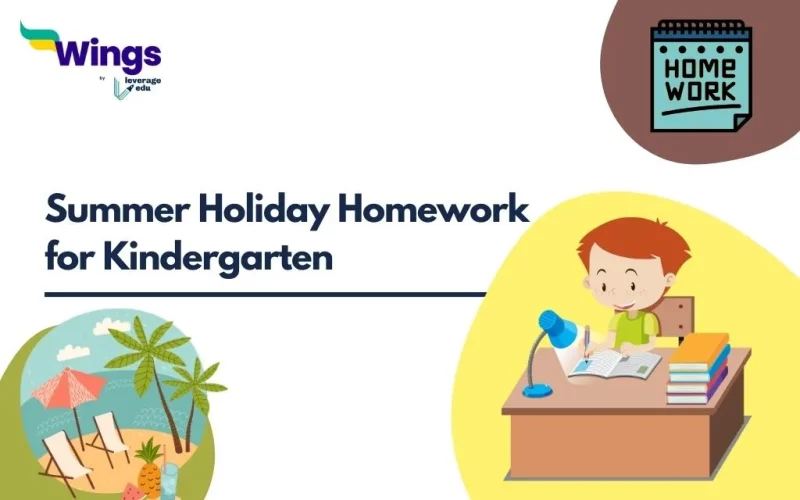
Summer Holiday Homework for Kindergarten: While summer vacation is a time for enjoyment and rest, it’s also a fantastic chance for young children to continue learning and keeping their minds occupied. Put an end to tedious spreadsheets! There are tonnes of original holiday assignment ideas for kindergarten students in this blog post. To make summer learning exciting for kids, instructors, and parents, we will cover themes like nature exploration, arts and crafts, and even healthy living.
Table of Contents
- 1.1 Nature Walk Scavenger Hunt
- 1.2 Fingerprint Art Animals
- 1.3 Beach in a Box
- 1.4 Build a Cardboard City
- 1.5 Sing a Song, Learn a Rhyme
- 1.6 Draw What You See
- 1.7 Help with the Cooking
- 2.1 Study of Nature
- 2.2 Creativity and Narrative
- 2.3 Family and Community
- 2.4 Arts and Crafts
- 2.5 Music and Motion
- 2.6 Variation in Cultural
- 2.7 Healthy Living
- 3.1 Outdoor Art Gallery
- 3.2 Family Recipe Book
- 3.3 Musical Instruments
- 3.4 Family Time Capsule
- 3.5 Photo Journal
Creative Summer Holiday Homework for Kindergarten Class
The focus of kindergarten education is on learning through exploration and play. Thus, summer schoolwork should be enjoyable and stimulating to keep young minds occupied! Here are a few creative suggestions for summer holiday homework for kindergarten
Nature Walk Scavenger Hunt
Make a list of items they can discover outside, such as leaves, flowers, and pinecones, and include images or brief descriptions. Allow them to explore the backyard or park so you can cross them off the list!
Fingerprint Art Animals
Make use of paper and stamp pads. Allow children to produce fingerprints, then use markers or crayons to transform them into amusing animal shapes.
Beach in a Box
Sand (or brown sugar) can be used to fill a box, then add little plastic toys like boats, seashells, and toy fish. Allow their creativity to go off!
Build a Cardboard City
Don’t discard cardboard boxes! Allow them to construct a city with you that includes structures, tunnels, and possibly even a cardboard vehicle.
Sing a Song, Learn a Rhyme
Select a short rhyme or song with a summer theme. To keep those small voices chirping throughout the holidays, practice it together.
Draw What You See
Take them to a beautiful location, like a park. Allow children to sketch what they observe, emphasising colours and shapes.
Help with the Cooking
Even easy chores like combining ingredients or decorating cookies can provide enjoyable learning opportunities. Allow them to assist you in the kitchen this summer!
Explore Art Therapy Courses !
Creative Summer Holiday Homework for Kindergarten Class: Common Themes
Creating imaginative summer homework for kindergarten students can benefit from concentrating on themes that are interesting and suitable for their age group. You can build a range of interesting and fulfilling summer homework assignments for kindergarten classrooms that meet the interests and developmental needs of the students by incorporating these common themes.
The following popular themes might serve as inspiration for imaginative kindergarten activities:
Study of Nature
Encourage kids to observe plants, insects, and animals to learn more about the natural world they live in. They can establish a little garden at home, go on family nature walks, and gather flowers and leaves.
Creativity and Narrative
Encourage kids to use their imaginations to make up stories, characters, and artwork to help them become more creative. They can create their own stories, doodle, or set up scenes to be performed with toys or puppets.
Family and Community
Encourage kids to find out more about their families and communities to foster a sense of connection and belonging. They can make a family tree, take images of their homes, or conduct interviews with family members.
Arts and Crafts
Give kids the chance to express themselves through crafts and art. They can create one-of-a-kind masterpieces by painting, drawing, collaging, or working with clay.
Music and Motion
Encourage kids to experiment with music and movement by having them sing, dance, and play simple instruments. They can manufacture their instruments, choreograph dances, and write songs.
Variation in Cultural
Honour variety by exposing kids to many cultures, customs, and holidays from across the globe. Through crafts, songs, and stories, they can learn about festivals, holidays, and customs.
Healthy Living
Encourage youngsters to learn about proper diet, exercise, and self-care to foster healthy behaviours. They can participate in outdoor activities, assist with the preparation of wholesome snacks, or practice mindfulness or yoga as a form of relaxation.
Also Read: 5 Best Social-Emotional Learning Activities
Kindergarten Class Holiday Homework Summer Vacation
We have some original suggestions for kindergarten class holiday assignments for the summer break in this part. These suggestions provide a variety of entertaining, instructive, and artistic summertime activities to keep kids interested and learning.
Outdoor Art Gallery
Encourage kids to gather organic elements such as stones, foliage, and blossoms to produce artwork outside. They can take pictures and organise them into shapes or patterns to show the class later.
Family Recipe Book
Encourage kids to gather their family’s favourite recipes and compile them into a little recipe book. They can assist with basic kitchen duties or create illustrations of the cuisine.
Musical Instruments
Encourage kids to use common home items, such as empty containers, rice for shakers, or rubber bands stretched over a box to create an improvised guitar, to create simple musical instruments. They can write original music and perform it for their loved ones.
Family Time Capsule
Encourage kids to construct a time capsule with mementos and souvenirs from their summer break. They can store it away to be opened at a later time or bury it in the backyard.
Photo Journal
Give every youngster a disposable camera, or let them use a smartphone to snap pictures of their summertime experiences under your supervision. When they get back, they can make a collage or picture journal to present to the class.
Explore interesting ideas for school children here :
Ans: Some common kindergarten class summer holiday ideas are: Nature walk, scavenger hunt Fingerprint art animal Beach in a box Build a cardboard city Sing a song, learn a rhyme
Ans: The top ideas for summer vacation homework are: Outdoor art gallery Family time capsules Family recipe book Musical Instruments
Ans: They can create one-of-a-kind masterpieces by painting, drawing, collaging, or working with clay.
To engage children in other school education activities, follow Leverage Edu now!!
Aayushi Vardhan
Leave a Reply Cancel reply
Save my name, email, and website in this browser for the next time I comment.
Contact no. *

Connect With Us
45,000+ students realised their study abroad dream with us. take the first step today..

Resend OTP in

Need help with?
Study abroad.
UK, Canada, US & More
IELTS, GRE, GMAT & More
Scholarship, Loans & Forex
Country Preference
New Zealand
Which English test are you planning to take?
Which academic test are you planning to take.
Not Sure yet
When are you planning to take the exam?
Already booked my exam slot
Within 2 Months
Want to learn about the test
Which Degree do you wish to pursue?
When do you want to start studying abroad.
January 2024
September 2024
What is your budget to study abroad?

How would you describe this article ?
Please rate this article
We would like to hear more.
Have something on your mind?

Make your study abroad dream a reality in January 2022 with
India's Biggest Virtual University Fair

Essex Direct Admission Day
Why attend .

Don't Miss Out
Summer learning loss: What is it, and what can we do about it?
Subscribe to the center for economic security and opportunity newsletter, david m. quinn and david m. quinn assistant professor of education - university of southern california morgan polikoff morgan polikoff associate professor of education - usc rossier school of education.
September 14, 2017
- 14 min read
As students return to school this fall, many of them – perhaps especially those from historically disadvantaged student groups – will be starting the academic year with achievement levels lower than where they were at the beginning of summer break. This phenomenon – sometimes referred to as summer learning loss, summer setback, or summer slide – has been of interest to education researchers going back as far as 1906. 1 We review what is known about summer loss and offer suggestions for districts and states looking to combat the problem.
An early comprehensive review of the literature summarized several findings regarding summer loss. 2 The authors concluded that: (1) on average, students’ achievement scores declined over summer vacation by one month’s worth of school-year learning, (2) declines were sharper for math than for reading, and (3) the extent of loss was larger at higher grade levels. Importantly, they also concluded that income-based reading gaps grew over the summer, given that middle class students tended to show improvement in reading skills while lower-income students tended to experience loss. However, they did not find differential summer learning in math, or by gender or race in either subject.
The recent literature on summer loss has been mixed. One study using data from over half a million students in grades 2-9 from a southern state (from 2008-2012) found that students, on average, lost between 25 – 30 percent of their school-year learning over the summer; additionally, black and Latino students tended to gain less over the school year and lose more over the summer compared to white students. 3 However, an analysis of the nationally-representative Early Childhood Longitudinal Study, Kindergarten Class of 2010 – 11 (ECLS-K:2011) found little evidence of overall loss over the summers after grades K and 1, and the summer socioeconomic status gaps widened in some subjects and grades but not others. 4 Von Hippel and Hamrock re-analyzed two earlier data sets and concluded that gaps “do not necessarily…grow fastest over the summer” (p.41). 5 Thus, it seems summer loss and summer gap-growth occur, though not universally across geography, grade level, or subject.
Entwisle, Alexander, and Olson’s “faucet theory” offers an explanation as to why lower-income students might learn less over the summer compared to higher-income students. 6 According to the theory, the “resource faucet” is on for all students during the school year, enabling all students to make learning gains. Over the summer, however, the flow of resources slows for students from disadvantaged backgrounds but not for students from advantaged backgrounds. Higher-income students tend to continue to have access to financial and human capital resources (such as parental education) over the summer, thereby facilitating learning. 7
Students’ achievement scores declined over summer vacation by one month’s worth of school-year learning.
Traditionally, educators and policymakers have relied on conventional summer school programs to combat summer loss and summer gap-growth. In 2000, Cooper and colleagues published a comprehensive meta-analysis of classroom-based summer programs finding positive effects on average. 8 However, they also concluded that middle-income students benefited more from summer programming than did lower-income students. They speculated that this could be because programs serving more advantaged students were of higher quality, or because of an interactive effect between programming and the home resources available to students. The result raised the concern that attempts to stem summer learning loss may actually exacerbate summer gap-growth if they are not well targeted.
Kim and Quinn conducted a meta-analysis of 41 summer reading programs from 35 studies published after the Cooper et al. review. 9 Like Cooper and colleagues, Kim and Quinn found summer reading programs to be effective at raising test scores, on average. Unlike Cooper, however, Kim and Quinn found that it was low-income students who benefited most from summer reading programs (even when restricting the comparison to higher- and lower-income students attending the same program). Furthermore, they concluded that the reason lower-income students benefited more was that lower-income students in these studies were more likely than higher-income students to experience summer loss when not participating in the summer programs. The authors noted several differences between their review and Cooper et al.’s that could explain the contrasting results: 1) Kim and Quinn analyzed only reading programs, while Cooper and colleagues combined math and reading programs, 2) Kim and Quinn included only two-group experimental and quasi-experimental studies, while Cooper and colleagues included single-group pre/post-test designs, and 3) Kim and Quinn included home-based programs in their review.
Naturally, school-based summer school programs vary in their effectiveness. Many of the recommendations for creating high-quality programs come in the form of expert opinion. Common suggestions include blending academic learning with hands-on or recreational activities, professionalizing summer school staff, and forming partnerships with community organizations to leverage resources. 10 We can also draw some lessons from research. For instance, the recent meta-analysis found that programs were more effective when they used research-based literacy instruction; specifically, programs using instructional strategies identified by the National Reading Panel as best practices had the largest impact on students’ reading comprehension scores (equivalent to moving from the 50 th to the 65 th percentile of a normal distribution). Program effectiveness also differed by literacy domain—programs were effective at raising students’ reading comprehension and fluency/decoding scores but not their vocabulary scores. Not surprisingly, research also suggests that programs are more effective when students attend consistently and spend more time on task academically. 11
While school-based summer learning programs hold promise when they fit the above criteria, they often fail to live up to these expectations. Two important reasons why school-based summer programs can be ineffective are that organizers often struggle to attract high quality teachers and struggle to appeal to students and families for whom the opportunity costs of attending summer school can be high. 12 13 School-based programs can also be quite costly. Researchers have therefore experimented, with some success, with lower-cost home-based summer programming.
One example of a home-based summer reading program that has been shown to be effective for low-income upper elementary school students is READS for Summer Learning. 14 In READS, which has been iteratively modified over several randomized trials, students receive eight books in the mail over the summer that are matched to their reading level and interests. Along with each book, students receive a tri-fold paper that leads them through a pre-reading activity and a post-reading comprehension check. Students are asked to mail the postage-prepaid tri-fold back; families receive reminders when tri-folds are not returned. Additionally, teachers deliver scripted lessons at the end of the school year to prepare students to productively read independently over the summer with the trifold scaffold. A recent study found that READS had an effect on low-income students’ reading comprehension the spring following their participation in the intervention (ES=.05 SD on the state reading test), 15 and other work suggests that the tri-fold acts as a mediator of the program effect. 16
Another recent randomized trial showed that something as simple as sending text messages over the summer to families of elementary school students at risk of summer loss was effective at improving the reading scores of third- and fourth-graders (but not first or second graders), with effect sizes of .21 to .29. 17 The text messages included tips on resources available to students over the summer, ideas for activities to do with children, and information about the value of particular summer learning activities.
Home-based programs such as these can be more cost-effective than school-based interventions. For example, the cost of READS per student is estimated to be between $250-$480, compared to other programs providing supplementary education services that can cost as much as $1,700 per student and have similar or less favorable cost effectiveness ratios.
Kim and Quinn included home-based programs in their meta-analysis, and encouragingly, they found that the effects of home-based programs were not significantly different from their more expensive classroom-based alternatives. At the same time, the effects from these programs might not be as large as the effects of the highest-quality school-based programs that use research-based instructional strategies.
Schools and districts should want to address the issue of summer learning loss not only because it may exacerbate achievement gaps, but also because it “wastes” so much of the knowledge students have gained during the school year. Summer loss also undoubtedly increases the amount of time teachers have to spend “re-teaching” last year’s content, likely contributing to the repetitiveness of the typical U.S. curriculum. 18 While investing in extensive school-based summer options may be infeasible, it may be cost-effective and strategic for districts to begin to offer targeted out-of-school interventions to the students most at risk of backsliding. In designing such programs, policymakers should keep in mind the recommendations from the research described above:
- Center the program around evidence-based curriculum.
- In addition to academic content, include hands-on or recreational activities to attract students.
- Ensure that program structure enables sufficient time on task, and have policies or incentives that encourage consistent attendance.
- Invest in hiring the most effective teachers.
Regardless of the design, these policies should offer engaging options for students over the summer so that summer learning programs do not feel like punishment for students who would rather be enjoying summer vacation. Doing so would set more students up for success as the school year gets underway.
The authors did not receive any financial support from any firm or person for this article or from any firm or person with a financial or political interest in this article. They are currently not an officer, director, or board member of any organization with an interest in this article.
Related Books
Christopher Jencks, Meredith Phillips
August 1, 1998
Richard N. Cooper, Barry Eichengreen, Gerald Holtham, Robert D. Putnam, C. Randall Henning
June 1, 1989
Kim Gould Ashizawa, Tadashi Yamamoto
September 1, 1999
- Cooper H., Nye B., Charlton K., Lindsay J., Greathouse S. (1996). The effects of summer vacation on achievement test scores: A narrative and meta-analytic review. Review of Educational Research, 66(3), 227–268. http://journals.sagepub.com/doi/10.3102/00346543066003227
- Atteberry, A., & McEachin, A. (2016). School’s out: Summer learning loss across grade levels and school contexts in the United States today. In Alexander, K., Pitcock, S., & Boulay, M. (Eds). Summer learning and summer learning loss, pp35-54 . New York: Teachers College Press.
- Quinn, D.M., Cooc, N., McIntyre, J., & Gomez, C.J. (2016). Seasonal dynamics of academic achievement inequality by socioeconomic status and race/ethnicity: Updating and extending past research with new national data. Educational Researcher, 45 (8), 443-453. http://journals.sagepub.com/doi/abs/10.3102/0013189X16677965?journalCode=edra
- Von Hippel, P.T., & Hamrock, C. (2016). Do test score gaps grow before, during, or between the school years? Measurement artifacts and what we can know in spite of them. (Social Science Research Network working paper). Retrieved from http://papers.ssrn.com/sol3/papers.cfm?abstract_id=2745527
- Entwisle D. R., Alexander K. L., Olson L. S. (2000). Summer learning and home environment. In Kahlenberg R. D. (Ed.), A notion at risk: Preserving public education as an engine for social mobility (pp. 9–30). New York, NY: Century Foundation Press
- Borman G. D., Benson J., Overman L. T. (2005). Families, schools, and summer learning. The Elementary School Journal, 106 (2), 131–150. http://www.journals.uchicago.edu/doi/abs/10.1086/499195
- Cooper, H., Charlton, K., Valentine, J. C., & Muhlenbruck, L. (2000). Making the most of summer school: A meta-analytic and narrative review. Monographs of the society for research in child development , 65, i-127. https://www.jstor.org/stable/3181549
- Kim J. S., Quinn D. M. (2013). The effects of summer reading on low-income children’s literacy achievement from kindergarten to grade 8 a meta-analysis of classroom and home interventions. Review of Educational Research, 83 (3), 386–431. http://journals.sagepub.com/doi/10.3102/0034654313483906
- McLaughlin B., Pitcock S. (2009). Building quality in summer learning programs: Approaches and recommendations (White Paper Commissioned by the Wallace Foundation). Retrieved from: http://www.wallacefoundation.org/knowledge-center/documents/building-quality-in-summer-learning-programs.pdf
- Augustine, CH, Sloan McCombs, J., Pane, JF, Schwartz, HL, Schweig, J., McEachin, A. and Siler-Evans, K. (2016). Learning from Summer: Effects of Voluntary Summer Learning Programs on Low-Income Urban Youth. Santa Monica, CA: RAND Corporation. Retrieved from: https://www.rand.org/pubs/research_reports/RR1557.html
- Denton D. R. (2002). Summer school: Unfulfilled promise. Atlanta, GA: Summer Regional Education Board. Retrieved from: http://files.eric.ed.gov/fulltext/ED467662.pdf
- McLaughlin & Pitcock (2009)
- e.g., Kim, J.S., Guryan, J., White, T.G., Quinn, D.M., Capotosto, L., & Kingston, H.C. (2016). Delayed effects of a low-cost and large-scale summer reading intervention on elementary school children’s reading comprehension. Journal of Research on Educational Effectiveness, 9 sup1, 1-22. http://www.tandfonline.com/doi/abs/10.1080/19345747.2016.1164780?journalCode=uree20
- Guryan, J., Kim, J.S., & Quinn, D.M. (2014). Does reading during the summer build reading skills? Evidence from a randomized experiment in 463 classrooms. NBER Working Paper No. 20689. http://www.nber.org/papers/w20689
- Kraft, M.A., & Monti-Nussbaum, M. (in press). Can schools empower parents to prevent summer learning loss? A text messaging field experiment to promote literacy skills. The ANNALS of the American Academy of Political and Social Science . https://scholar.harvard.edu/files/mkraft/files/kraft_monti-nussbaum_2017_can_schools_empower_parents_to_prevent_summer_learning_loss_annals.pdf
- Polikoff, M.S. (2012). The redundancy of mathematics instruction in US elementary and middle schools. The Elementary School Journal , 113 (2), 230-251. http://web-app.usc.edu/web/rossier/publications/66/The%20Redundancy%20of%20Math%20Instruction.pdf
K-12 Education
Economic Studies
Center for Economic Security and Opportunity
Online only
9:30 am - 11:00 am EDT
Douglas N. Harris
August 13, 2024
Rachel M. Perera, Jon Valant, Katharine Meyer
August 12, 2024
Pardon Our Interruption
As you were browsing something about your browser made us think you were a bot. There are a few reasons this might happen:
- You've disabled JavaScript in your web browser.
- You're a power user moving through this website with super-human speed.
- You've disabled cookies in your web browser.
- A third-party browser plugin, such as Ghostery or NoScript, is preventing JavaScript from running. Additional information is available in this support article .
To regain access, please make sure that cookies and JavaScript are enabled before reloading the page.
11 New Summer Books You Can Still Add to Your Reading List
We've got your next beach read right here.

We've been independently researching and testing products for over 120 years. If you buy through our links, we may earn a commission. Learn more about our review process.
There’s something truly special about summer reading. Whether you call them "beach reads," "summer flings" or simply "great books of the season," the best books of summer 2024 will transport you to a sunny getaway, no matter the weather.
No matter your summer reading style, you're sure to find something to love on this list. Grab a stack of these books to take with you wherever the sun leads you before Labor Day — and when you’re finished, dive into the Good Housekeeping Book Club for even more feel-good reads.
'Plays Well With Others' by Sophie Brickman

“Mother Inferior” Anne Lewin is a sassy New York City-based advice columnist who gets completely swept up in the madness of the elite kindergarten admissions process. With three kids under 5, a workaholic husband, and a cunning archrival, her life turns into chaos — but it’s pure comedic gold for readers.
'Sandwich' by Catherine Newman

Rocky's annual summer week in Cape Cod takes on an unusual poignancy — not just because of menopause, but also due to the deep emotions she feels for her aging parents, adult children, sweet husband, her cat Chicken and a few long-held, sorrowful secrets. Books with this kind of warmth and humor are truly rare.
'There Are Rivers in the Sky' by Elif Shafak

Braiding together the stories of three narrators across millennia and continents, and tracing the journey of a single drop of water, this powerhouse author has crafted a rapturous feat of storytelling. From the ancient shores of the Tigris River to a houseboat on the Thames in 2018, an immersive adventure awaits you.
'House of Glass' by Sarah Pekkanen

Did that little girl push her nanny out the window? As the lawyer assigned to the case, Stella quickly realizes there are plenty of other suspects, including the heiress mother, the landscaper father, the live-in grandmother and the nanny’s boyfriend. On the other hand, little Rose is pretty darn creepy. If you love trying to predict twists, this is the thrill ride for you.
RELATED: The Best Thrillers and Crime Books
'The Summer Pact' by Emily Giffin

A trio of college friends are devastated when the fourth member of their group, a star athlete, commits suicide. Now in their early 30s, with their own lives in flux, the three fall back on the pact they made years ago to stick together. Reuniting for a blissful getaway in Capri, they discover that life still has major surprises in store.
'Long Island Compromise' by Taffy Brodesser-Akner

Good Housekeeping 's July book club pick, Long Island Compromise centers on the kidnapping of a wealthy factory owner and the decades of family trauma that follow his return. But if anything has ever proven that laughter is the best medicine, it’s this book. The saga of the Fletchers in their ritzy Long Island suburb delivers brilliant psychological insight and spot-on cultural context along with dialogue so funny, it hurts.
'The Queen City Detective Agency' by Snowden Wright

Black ex-cop Clementine Baldwin and her white partner, Dixon Hicks, are the Nick and Nora of Meridian, MS. Hired by the mother of a recently deceased prison inmate to prove his death was no accident, they follow a trail that leads straight to the heart of the Dixie Mafia — complete with plenty of wit and bourbon along the way.
'The Same Bright Stars' by Ethan Joella

Head down to the Delaware shore with Jack Schmidt, the 52-year-old owner of a family restaurant he’s worked at since boyhood. A corporate chain wants to buy him out, and Jack, who feels "old" at 52, is tempted. The unlikely temptress is Nicole, the chain’s loud but intriguing representative who won’t take no for an answer. But what about the loyal Schmidt’s crew, whose livelihoods depend on Jack? When an ex reappears with shocking news, this endearing man realizes that his life is changing, whether he likes it or not.
'Slow Dance' by Rainbow Rowell

Shiloh and Cary are low on money, long on baggage and high on each other — the relationship they put on hold 14 years ago is reignited at the wedding of a mutual friend. The tension builds through atmospheric flashbacks to their 1990s high school days and Rowell’s signature saucy banter.
'The Next Mrs. Parrish' by Liv Constantine

In this sequel to The Last Mrs. Parrish , Constantine’s magnificent evil creation, Amber, is back. The husband she stole in the last book is finishing up his prison sentence, but she’s dreading his return — especially since she blew through all his money while he was locked up. Her plan to leave their baby with the nanny and disappear is foiled, and now the women whose lives she’s ruined are coming for her. Good luck, ladies!
'And So I Roar' by Abi Daré

The 14-year-old “girl with the louding voice,” whom we met in this young Nigerian author’s debut book , is back. Adunni’s rescuer and mentor, Tia, has helped her win a scholarship to a school in Lagos, but the backward, patriarchal ways of the village are not through with her yet — and their terrifying representatives are literally at the gate.

Lizz (she/her) is a senior editor at Good Housekeeping , where she runs the GH Book Club, edits essays and long-form features and writes about pets, books and lifestyle topics. A journalist for almost two decades, she is the author of Biography of a Body and Buffalo Steel. She also teaches journalism as an adjunct professor at New York University's School of Professional Studies and creative nonfiction at the Muse Writing Center, and coaches with the New York Writing Room.

@media(max-width: 64rem){.css-o9j0dn:before{margin-bottom:0.5rem;margin-right:0.625rem;color:#ffffff;width:1.25rem;bottom:-0.2rem;height:1.25rem;content:'_';display:inline-block;position:relative;line-height:1;background-repeat:no-repeat;}.loaded .css-o9j0dn:before{background-image:url(/_assets/design-tokens/goodhousekeeping/static/images/Clover.5c7a1a0.svg);}}@media(min-width: 48rem){.loaded .css-o9j0dn:before{background-image:url(/_assets/design-tokens/goodhousekeeping/static/images/Clover.5c7a1a0.svg);}} All the Best Books to Read Next

A Full List of Our GH Book Club Picks

The Most Inspirational Books to Read Now

How to Start a Book Club, According to an Author

Tamron Hall Has Major Career News to Share

There's a New 'Hunger Games' Book in the Works

How to Get Free Books from Barnes & Noble

Laura Jarrett on Her Kids' Book With Poppy Harlow

Craig Melvin Discusses His New Book for Kids

Luis A. Miranda Jr. on Family and His Latino Roots

'Today' Star Al Roker Talks Work-Life Balance

Essential LGBTQ+ Books to Read for Pride

- Dragon Quest Island
- Godzilla interception operation
- NARUTO & BORUTO Shinobizato
- Crayon Shinchan Adventure Park
- SPY×FAMILY in Nijigennomori ~Doki Doki Miroto Flower Park~
- Monster Hunter: The Field

- Purchase Tickets

2024.08.18 Event & Feature Godzilla interception operation dragon quest island
[Elementary school students must see!] Perfect for free crafts! A craft experience you can do at Nijigen no Mori! Finish your summer vacation homework while you're out and about!
post_content); echo $this_content;? -->

Have fun finishing your summer homework with Nijigen no Mori! Check out all the craft experiences currently being held!
There are only two weeks left of summer vacation, and some of you may be feeling anxious about not being able to finish your summer homework. We have some great news for you! At Nijigen no Mori, we are currently running a variety of craft experiences and events that are perfect for summer vacation free-time crafts! This is your chance to kill two birds with one stone by having fun while finishing your homework! Make the most of your summer vacation by creating some amazing memories at Nijigen no Mori!
You can freely design your own slime!

Next to the castle in the hugely popular attraction "Dragon Quest Island" is the "Onocogard Studio," where you can experience art! Paint the pure white unglazed slime however you like! It's up to you whether you want to stay true to the original colors or go all out and make something original! How about making a one-of-a-kind slime to commemorate your big adventure?
Slime coloring experience overview
Onokogardo Workshop ("Dragon Quest Island" Onokogardo Castle Next)
Opening hours
10:00-18:30 (last entry at 18:00) * However, it will end as soon as the unglazed slime for the day is sold out.
ASK *Tickets are sold at the reception desk of Onokogardo Castle. *Admission tickets to "Dragon Quest Island" are not required.
Experience flow
①Purchase a ticket at the castle reception ② Show your ticket at the venue "Onokogardo Kobo" ③Hand over pure white slime ④ Use acrylic paint and paint in your favorite color ⑤ Dry it with a hair dryer and it's done!
You can take home the slime you made!
Required Time
Click here for details on the "Slime Coloring Experience"

Create and observe your own original Godzilla!

The Godzilla Painting Laboratory, located next to the "Godzilla Intercept Operation - National Godzilla Awajishima Research Center," is currently holding a craft event called "Godzilla Unglazed Painting Experience"! You can paint the pure white unglazed Godzilla as you like and create your own original Godzilla! You can take the painted Godzilla home with you and use it as a decoration in your home! Furthermore, from Saturday, August 2024, 8, "Mothra Unglazed Color Painting Experience" Also scheduled to be held! A terracotta pottery of the popular monster "Mothra" will also be available! The sight of them lined up makes a big impact! You can make something cool! You can also make something cute! Experience crafting at Nijigen no Mori this summer!
Godzilla Unglazed Painting Experience Overview
Godzilla Painting Laboratory next to the Godzilla Museum
10:00-18:30 (last entry at 18:00)
ASK *Tickets are sold at the Godzilla Interception Operation Reception *Even if you have not purchased an attraction ticket, you can participate. *You can take home your original painted Godzilla.
Click here for event details

What is “Dragon Quest Island Ancient Demon God and Guided Adventurers”?

"Dragon Quest Island Ancient Demon God and Guided Adventurers" is a field RPG attraction that expresses the world of "Dragon Quest" by fusing real and digital.
Attraction participants can become the main character of the story while following the original story, and enjoy the world of "Dragon Quest" through adventure!
" Dragon Quest Island Ancient Demon God and Guided Adventurers Click here for details
10:00₋22:00 (last entry 19:30) *The final admission time for Gold Tickets and Premium Tickets is 19:00 p.m. *Business hours may vary depending on the season.Detail is Nijigennomori Official X
Ticket price
[Light Ticket (Admission + Main Quest)] Adults (12 years and over): 3,400 to 4,500 yen , Children (ages 5 to 11): 1,800 to 2,500 yen [Gold Ticket (Light Ticket + Side Quest)] Adults (12 years old and over, junior high school students and over): 5,400 to 6,500 yen; Children (5 to 11 years old): 3,100 to 3,800 yen [Premium Ticket (Gold Ticket + Premium Goods)] Adults (12 years old and over, junior high school students and over): 12,400 to 13,500 yen; Children (5 to 11 years old): 10,800 to 11,500 yen
We recommend purchasing tickets online!
Purchase your tickets in advance to get in smoothly!
Click here to purchase tickets
What is the Godzilla interception operation?
"Godzilla Intercept Operation" is the world's only entertainment attraction where you can fully experience the power and power of Godzilla, with the theme of the world's largest life-size Godzilla that landed on Awaji Island.Participants become members of the National Godzilla Awajishima Research Center, and after receiving an explanation of the "Godzilla interception operation" that unfolds against Godzilla that has appeared on Awaji Island through a movie-like attraction video produced by Toho, Godzilla Cell Shooting" Challenge the attraction.At the world's first permanent "Godzilla Museum", with the cooperation of Toho Visual Art Co., Ltd., which has been responsible for the special effects art of Godzilla movies, there is a powerful diorama that makes you feel like you are right in front of the movie scene. It's on display.
Click here for the special site for "Godzilla Intercept Operation"
10:00₋22:00 (last entry 20:00) *Business hours may vary depending on the season.Detail is Nijigen no Mori Official Twitter
Godzilla Intercept Operation Light Ticket Adult (12 years old and over) / 2,800 yen ~ 3,600 yen (tax included) Children (ages 5 to 11) / 1,800 yen ~ 2,200 yen (tax included)
Godzilla Intercept Operation Gold Ticket Adult (12 years old and over) / 4,800 yen to 5,600 yen (tax included) Children (ages 5 to 11) / 3,100 yen ~ 3,500 yen (tax included)
Godzilla Intercept Operation Premium Ticket Adult (12 years old and over) / 11,300 yen to 12,100 yen (tax included) Children (ages 5 to 11) / 9,600 yen ~ 10,000 yen (tax included)
*Adults (height 120cm or more / weight 25kg or more but less than 110kg), Children (height 120cm or more / weight 25kg to less than 110kg) *The attractions you can experience will vary depending on the category.For more information, please check the ticket details on the special website.
Purchase your tickets in advance to get in smoothly! Click here to purchase tickets
Overview of Hyogo Prefectural Awajishima Park Anime Park “Nijigen no Mori”
Since 2008, Pasona Group has collaborated with local governments and local stakeholders on Awaji Island, Hyogo Prefecture, and has been working on its own regional revitalization project by attracting various human resources. In 2013, the "Awaji Manga/Anime Island Project" was adopted as part of the "Private Business Planning and Proposal for Prefectural Awajishima Park" publicly invited by Hyogo Prefecture. Together with Hyogo Prefecture, we are promoting regional revitalization projects by attracting tourists.
Click here for details on "Nijigen no Mori"
\ Check the latest information on the Nijigen Nomori official website and Twitter! /
©ARMOR PROJECT/BIRD STUDIO/SQUARE ENIX
Purchase your tickets in advance to get in smoothly! Please confirm your visit date and proceed to purchase tickets.
- Crayon Shin-chan Adventure park
- Dragon quest Island
- SPY×FAMILY in Nijigennomori ~ DOKIDOKI Maze to Flower Park
- Kid's limited enjoyment pass
- United Kingdom
17 Hot-Weather Outfits For A Late-Summer Vacation

More from Fashion
R29 original series.
Advertisement
Supported by
Late-Summer Travel Plans? You Might Want to Put On a Mask.
With U.S. Covid-19 cases at very high levels and new vaccines still several weeks away, we asked experts for their advice on when and where to wear a mask.
- Share full article

By Ceylan Yeğinsu and Dani Blum
It is the height of the summer travel season: Airplanes and cruises are packed, hotels are booked, and travelers are crowding theme parks and attractions. Yet throughout the United States, Covid-19 is currently circulating at very high levels.
During the peak of the pandemic, masks were ubiquitous in hotels, airports and other public places. They were required to fly , and many travelers donned them elsewhere to help reduce the transmission of the deadly coronavirus. Since the end of the mandate, and as travel has returned to or surpassed prepandemic levels , most travelers have abandoned preventive measures, particularly masks.
With updated vaccines not available until the fall , experts are reminding travelers about the benefits of masking, particularly in airports and poorly ventilated indoor environments.
Here’s what you need to know about masks and your travel plans.
What’s going on with Covid right now?
The number of reported cases appears to be climbing both in the United States and abroad. In the United States, there are “very high” levels of the virus in wastewater samples nationwide, according to the Centers for Disease Control and Prevention. The World Health Organization reported that cases around the globe rose by 30 percent from June 24 to July 21, compared with the previous 28 days. Put simply: There’s a lot of Covid out there.
How effective are masks? What is the best mask to use?
People who want to minimize their risk of respiratory illnesses like Covid (along with colds and the flu) should wear a mask while traveling, experts say. Even if you’re the only person wearing one on a train or at an airport, a mask continues to offer protection — provided you wear it properly, which means covering both your nose and your mouth.
“It does not eliminate the risk, but it substantially reduces the risk of exposure,” said Dr. Ziyad Al-Aly, the chief of research and development at the Veterans Affairs St. Louis Healthcare System, in Missouri. Aim for a high-quality mask, like an N95, a KN95 or a KF94 , all of which filter out the overwhelming majority of virus particles and are far more effective at reducing the chance of a Covid infection than cloth or surgical versions. Masks should fit snugly on your face.
We are having trouble retrieving the article content.
Please enable JavaScript in your browser settings.
Thank you for your patience while we verify access. If you are in Reader mode please exit and log into your Times account, or subscribe for all of The Times.
Thank you for your patience while we verify access.
Already a subscriber? Log in .
Want all of The Times? Subscribe .
- Global (EN)
- Africa (EN)
- Australia (EN)
- Belgium (EN)
- Brasil (PT)
- Canada (EN)
- Canada (FR)
- France (FR)
- Germany (DE)
- Germany (EN)
- Hong Kong (EN)
- Indonesia (EN)
- Ireland (EN)
- Latin America (ES)
- Malaysia (EN)
- Middle East (EN)
- Netherlands (EN)
- 2024 TRUST BAROMETER
- About Edelman
- Diversity, Equity, Inclusion & Belonging
- Our Climate Commitments
- Citizenship
- Edelman Trust Barometer
- Edelman Trust Institute
- Edelman Trust Management
- Research Archive
- News & Awards
- Richard Edelman's 6AM Blog
- Summer Reading List
- Home …
- Insights …
I am just completing a two-week vacation. My greatest joy is finding a quiet place and devouring a book. Here’s a list of my favorite books that I read this summer.
The Demon of Unrest: A Saga of Hubris, Heartbreak, and Heroism at the Dawn of the Civil War by Erik Larson. This is a superb retelling of the months before the U.S. Civil War. Nobody wanted a war, but the resupply of Fort Sumter in South Carolina provided the spark.
White Rural Rage: The Threat to American Democracy by Tom Schaller and Paul Waldman. An unpacking of resentment from downward economic trajectory and loss of political power.
Age of Revolutions: Progress and Backlash from 1600 to the Present by Fareed Zakaria. For followers of the Edelman Trust Barometer there will be familiar themes of impact of technology, loss of belief in information and impact of globalization. A must read.
The Talented Mrs. Mandelbaum: The Rise and Fall of an American Organized-Crime Boss by Margalit Fox. The story of New York City's leading fence, who bought stolen goods including jewels and silks from local thieves. A portrait of 1880s Lower East Side New York.
The Incorruptibles: A True Story of Kingpins, Crime Busters, and the Birth of the American Underworld by Dan Slater. A crime busting Mayor of New York City in 1910 assembled a group of honest police who clean up the Jewish part of the Lower East Side. Prohibition follows and crime returns.
Waging a Good War: A Military History of the Civil Rights Movement, 1954-1968 by Thomas E. Ricks. This is a very different take on the Civil rights movement the use of military training to prepare for non-violent opposition to segregation.
Porfirio Diaz by Paul Garner. A biography of Mexico's longest serving president. He went from radical reformer to ultra establishment in creating modern Mexico via foreign investment.
The World: A Family History of Humanity by Simon Sebag Montefiore. This epic work catalogues the world's leaders from 700 BC to the present. The family strife makes Succession seem like child's play.
Into the Bright Sunshine: Young Hubert Humphrey and the Fight for Civil Rights by Samuel G. Freedman, describes the evolution of the Democratic party's stance on civil rights post-World War II, led by Minneapolis Mayor Hubert Humphrey, later a presidential candidate in 1968.
Brave Companions: Portraits In History by David McCullough. This is a series of essays on important but lesser-known figures in history such as Alexander von Humboldt, who explored South America's flora and fauna in the early 1800s; or Harriet Beecher Stowe author of Uncle Tom's Cabin, which was the fountainhead of anti-slavery thinking.
Yankee Stepfather: General O. O. Howard and the Freedmen by William S. McFeely. This is a biography of Oliver Otis Howard, Civil War general and director of the Freedmen’s Bureau after the Civil War. I knew McFeely, a professor at Mount Holyoke College, because he was the father of my Exeter roommate Drake McFeely. Howard was an unsuccessful general but hugely important figure in post War policy on newly freed blacks.
The Last Campaign: Sherman, Geronimo and the War for America by H.W. Brands. This is a superb tale of the last great Indian war with Civil War hero William Sherman tasked with pacifying the West and Geronimo the Apache chief determined to fight back the white settlers.
I have loved every minute of my reading blitz. I have felt like an undergraduate again. Maybe it took turning 70 to go so hard at it.
Richard Edelman is CEO.
Related Content

The Paris Olympics

Policy Vs. Politics: The Proper Role for Business in Coming Months

The Trust Summit: Ten Highlights
- How to Listen
- Brian Kilmeade Show
- FOX Across America with Jimmy Failla
- Guy Benson Show
- The Will Cain Show
- Premium Podcast Account Access
- FOX News Talk All-In-One Podcast
- FOX Across America Premium Podcast
- Brian Kilmeade Show Premium Podcast
- MEGAcast All-In-One Podcast
- FOX & Friends
- Outnumbered
- The Daily Briefing With Dana Perino
- Your World with Neil Cavuto
- Special Report with Bret Baier
- The Ingraham Angle
- Mornings With Maria
- Varney and Company
- Fox News Podcasts
- Fox Business
- Fox Deportes
- Fox TV Stations
- Fox News Commentary
- Station Finder
- Become an Affiliate

The Travel Hack Whisperer: The Points Guy Brian Kelly On Turning Rewards Into Gold
- Everyone Talks To Liz Claman
As the sun begins to set on Summer, we hope you got some good vacation time in! More than that…we hope you used some of your credit card points.
Brian Kelly is the Founder of “The Points Guy,” and is the leading voice in loyalty programs, points and miles, credit cards and travel. He joins Liz on the podcast to detail the journey to his genius idea and advise listeners on how to use credit card points to their advantage.
You May Be Interested In...

From Loss To Legacy: Columbia Sportswear CEO Tim Boyle Turned Grief Into Global Success

Hopping On The Barstool Of Life: Former Barstool Sports CEO Erika Ayers Badan

Reading, Risk & REWARD: How ReMax Founder Dave Liniger Went From Dropout To Mogul

Sugar High: Candyland Capitalist Dylan Lauren

‘Bilt’ To Last: How Ankur Jain Unlocked Rewards For Millions of Rent-Payers

Late-Night Snack Legend: How Insomnia Cookies Went From Apartment To Empire
- New Privacy Policy
- New Terms of Use
- (What’s New)
- Your Privacy Choices

IMAGES
COMMENTS
Goodbye, as well, to working her usual summer job as a lifeguard, which Sara unhappily has to forgo — along with the money she hoped to save for college. As her mother puts it, "Summer homework is a full-time job." A working vacation. Sara's not alone. The oxymoronically named "vacation work" is on the rise.
Read on for Zimmerman's summer homework game plan and ideas for how to make summer assignments more fun for everyone. 1. Try a New Student Meet and Greet. If possible, meet your incoming students before summer break (even if it's virtual!) to instill the importance of summer learning. At the end of the school year, coordinate with the ...
The ideal amount of time to spend doing summer homework per week is 2-3 hours, so figure out where that time fits into your child's average summer week. Tip 5: ... Options for homework to do on vacation include projects that are doable in small chunks—like reading a book or completing a math worksheet. Tip 9: ...
Give students some fun summer-themed spelling practice with this unique and engaging word search! Summer Writing Prompt #1: My Dream Vacation. Worksheet. In this summer writing prompt worksheet, children will describe their dream summer vacation. Summer Word Search #2. Worksheet. Have some fun in the summer sun!
The Importance of Summer Vacation Homework. The aim of summer holiday homework is multifaceted. It gives them a place to explore new ideas while also assisting in the retention of the knowledge they have acquired throughout the academic year. Students can develop their creativity, critical thinking, and problem-solving talents by doing their ...
Here are some things to keep in mind when assigning summer homework. 1. Make Sure the Tasks Count for Something. Nothing will generate ill will amongst students faster than telling them their summer work was all for naught, but you wouldn't believe how many teachers forget their students even had anything assigned over the summer break.
Using summer activity sheets is a great way to not only maintain learned skills, but begin the fall with a strong start. Whether you are a parent, teacher, or homeschooler - you will love these no-prep summer vacation homework for kindergarten which help students strengthen their fine motor skills while working on their math and literacy skills.
The summer holiday is therefore a good opportunity for students to explore areas of interest to them or to discover information about new and unfamiliar topics. Summer holiday homework divides teachers, parents and students in two sides: some see the benefits, the others do not. Yet, if planned creatively, summer assignments can be really fun.
While "play" was a popular response to the question of what type of work kids should be assigned in the summer, some educators suggested that students of all ages read during break to stay ...
The "Summer Vacation Activity Tracker Board" is an interactive and engaging tool that allows children to keep track of the activities they have completed during their summer break.It provides a visual representation of their progress and encourages a sense of accomplishment.Daily Activity Grid: The main section of the board consists of a grid-like structure with columns representing each day ...
Seeing the assignments clearly laid out will give you an idea of how to pace your work. 2. Make a schedule. On your first day of vacation, take a half-hour to plan out your study schedule for the summer. This simple exercise will dramatically reduce the stress you feel as you approach your summer homework.
The summer picture matching and counting worksheets are good for preschool age children while the summer word scramble, missing letters and summer cryptogram puzzle are geared toward kids a little older. Click on any of the images below to view and print the pdf version. We hope you enjoy these summer worksheets and make sure to also check out ...
Whether assigning vacation homework would help to diminish the effects of the summer learning loss is an open question, but an equally important set of questions revolves around what such "homework" would involve, how it would be "regulated" (i.e., would students choose or would they be forced to do homework?), and how it would be ...
Home > Holiday Worksheets > Summer. The following collection of worksheets contains a number of short reading passages covering topics associated with summer events, such as vacation destinations, why it gets hotter, finding a job, and more! Two separate answer sheets are associated with each passage. One is a multiple choice worksheet and the ...
Always motivated to provide visually appealing and interactive resources. Download a free activity now to delight your class or children. File previews. pdf, 1.81 MB. 20 home learning ideas for the summer break. Tasks are varied, including: writing, math, creative and social-emotional skills. Provide as a handout for children to select from.
Case #2: Able, Gifted and Talented Students. These are students who we really want to push and encourage. The summer vacation is a long-time to be away from formal education, and we don't want these students to lose momentum or interest. I've found that project work is particularly useful for these types of students.
Holiday Homework Solutions for class 1, 2, 3, 4, 5, 6, 7, 8, 9, 10, 11 & 12 (During Summer Vacations) facility for the academic session 2022-2023 is being ...
Summer Holiday Homework for Kindergarten: While summer vacation is a time for enjoyment and rest, it's also a fantastic chance for young children to continue learning and keeping their minds occupied.Put an end to tedious spreadsheets! There are tonnes of original holiday assignment ideas for kindergarten students in this blog post.
Kim and Quinn conducted a meta-analysis of 41 summer reading programs from 35 studies published after the Cooper et al. review. 9 Like Cooper and colleagues, Kim and Quinn found summer reading ...
Holiday homework has to be done under the parental guidance. Kindly complete and send the homework in a paper bag on the first day after the summer break. Make your ward read resource books. Make your ward learn and remember his/her parents mobile /landline number, house address etc, to make him/her independent and secure.
686 likes 80 comments. Here at Goodreads World Headquarters, we take summer reading seriously. Summertime is especially conducive to the book-reading lifestyle: You've got more vacation time, better outdoor-reading conditions, and expanded daylight hours to make it all happen. As part of our annual Summer Reading initiative, we've compiled ...
Descriptive Essay About My Summer Vacation It was a beautiful day to try something new at Doheny State Beach in Dana Point, California. It was a long year in fourth grade, and my family and I were excited to start our summer vacation. As we pulled our trailer on the southbound I-5 freeway towards San Diego, I could see the temperature gauge on my father's truck slowly dropping to the mid 70's.
SUMMER VACATION HOLIDAY HOMEWORK CLASS VIII ( 2019-20) R VACATION HOLIDAY HOMEWORKCLASS - VIII( 2019-20)"The capacity to learn is a gift; the ability to lea. n is a skill; the willingness to learn is a choice".Holiday Home. ork is an attempt to enhance children's imagination. Doing it in the right- spirit wit.
This story is part of our Dog Days Survival Guide, a collection of essays, recommendations and how-tos to help you get through the hottest days of the year. If you surveyed the American public on ...
Whether you call them "beach reads," "summer flings" or simply "great books of the season," the best books of summer 2024 will transport you to a sunny getaway, no matter the weather.
Finish your summer vacation homework while you're out and about! Have fun finishing your summer homework with Nijigen no Mori! Check out all the craft experiences currently being held! There are only two weeks left of summer vacation, and some of you may be feeling anxious about not being able to finish your summer homework. We have some great ...
Now Reading 17 Hot-Weather Outfits For A Late-Summer Vacation. Story from Fashion. ... 17 Hot-Weather Outfits For A Late-Summer Vacation. by Patricia Karounos. Most Wanted. Sparkles, Snakes ...
With U.S. Covid-19 cases at very high levels and new vaccines still several weeks away, we asked experts for their advice on when and where to wear a mask. By Ceylan Yeğinsu and Dani Blum It is ...
Summer Reading List I am just completing a two-week vacation. My greatest joy is finding a quiet place and devouring a book. Here's a list of my favorite books that I read this summer. The Paris Olympics I have just returned from a week in Paris. I was a bit manic, seeing eight different sports, loving every moment.
As the sun begins to set on Summer, we hope you got some good vacation time in! More than that...we hope you used some of your credit card points. Brian Kelly is the Founder of "The Points Guy ...